
The Acknowledgements Section
How to write the acknowledgements for your thesis or dissertation
By: Derek Jansen (MBA) | Reviewers: Dr Eunice Rautenbach | January 2024
Writing the acknowledgements section of your thesis might seem straightforward, but it’s more than just a list of names . In this post, we’ll unpack everything you need to know to write up a rock-solid acknowledgements section for your dissertation or thesis.
Overview: The Acknowledgements
- What (exactly) is the acknowledgements section?
Who should you acknowledge?
- How to write the section
- Practical example
- Free acknowledgements template
- Key takeaways
What is the acknowledgements section?
The acknowledgements section of your thesis or dissertation is where you give thanks to the people who contributed to your project’s success. Generally speaking, this is a relatively brief, less formal section.
With the acknowledgements section, you have the opportunity to show appreciation for the guidance, support, and resources provided by others during your research journey. We’ll unpack the exact contents, order and structure of this section in this post.
Need a helping hand?
Although this is a less “academic” section, acknowledging the right people in the correct order is still important. Typically, you’ll start with the most formal (academic) support received, before moving on to other types of support.
Here’s a suggested order that you can follow when writing up your acknowledgements:
Level 1: Supervisors and academic staff
Start with those who have provided you with academic guidance, including your supervisor, advisors, and other faculty members.
Level 2: Funding bodies or sponsors
If your research was funded, acknowledging these organisations is essential. You don’t need to get into the specifics of the funding, but you should recognise the important role that this made in bringing your project to life.
Level 3: Colleagues and peers
Next you’ll want to mention those who contributed intellectually to your work, including your fellow cohort members and researchers.
Level 4: Family, friends and pets
Last but certainly not least, you should acknowledge your personal (non-academic) support system – those who have provided emotional and moral support. If Fido kept you company during those long nights hunched over the keyboard, you can also thank him here 🙂
As you can see, the order of the acknowledgements goes from the most academic to the least . Importantly, your thesis or dissertation supervisor (sometimes also called an advisor) generally comes first . This is because they are typically the person most involved in shaping your project (or at least, they should be). Plus, they’re oftentimes involved in marking your final work and so a kind word never hurts…
All that said, remember that your acknowledgements section is personal . So, feel free to adjust this order, but do pay close attention to any guidelines or rules provided by your university. If they specify a certain order or set of contents, follow their instructions to the letter.

How to write the acknowledgements section
In terms of style, try to strike a balance between conveying a formal tone and a personal touch . In practical terms, this means that you should use plain, straightforward language (this isn’t the time for heavy academic jargon), but avoid using any slang, nicknames, etc.
As a guide, you’ll typically use some of the following phrases in the acknowledgements section:
I would like to express my appreciation to… for their help with… I’m particularly grateful to… as they provided… I could not have completed this project without… as this allowed me to… Special thanks to… who did… I had the pleasure of working with… who helped me… I’d also like to recognise… who assisted me with…
In terms of positioning, the acknowledgements section is typically in the preliminary matter , most commonly after the abstract and before the table of contents. In terms of length, this section usually spans one to three paragraphs , but there’s no strict word limit (unless your university’s brief states otherwise, of course).
If you’re unsure where to place your acknowledgements or what length to make this section, it’s a good idea to have a look at past dissertations and theses from your university and/or department to get a clearer view of what the norms are.

Practical Example
Alright, let’s look at an example to give you a better idea of what this section looks like in practice.
I would like to express my deepest gratitude to Professor Smith, whose expertise and knowledge were invaluable during this research. My sincere thanks also go to the University Research Fund for their financial support. I am deeply thankful to my colleagues, John and Jane, for their insightful discussions and moral support. Lastly, I must acknowledge my family for their unwavering love and encouragement. Without your support, this project would not have been possible.
As you can see in this example, the section is short and to the point , working from formal support through to personal support. If you’re interested, you can explore a few more examples here .
To simplify the process, we’ve created a free template for the acknowledgements section. If you’re interested, you can download a copy here .

FAQs: Acknowledgements
Can i include some humour in my acknowledgements.
A touch of light humour is okay, but keep it appropriate and professional. Remember that this is still part of an academic document.
Can I acknowledge someone who provided informal or emotional support?
Yes, you can thank anyone who offered emotional support, motivation, or even informal advice that helped you during your studies. This can include friends, family members, or a mentor/coach who provided guidance outside of an academic setting.
Should I mention any challenges or difficulties I faced during my research?
While the acknowledgements section is primarily for expressing gratitude, briefly mentioning significant challenges you overcame can highlight the importance of the support you received. That said, you’ll want to keep the focus on the gratitude aspect and avoid delving too deeply into the challenges themselves.
Can I acknowledge the contribution of participants in my research?
Absolutely. If your research involved participants, especially in fields like social sciences or human studies, acknowledging their contribution is not only courteous but also an ethical practice. It shows respect for their participation and contribution to your research.
How do I acknowledge posthumous gratitude, for someone who passed away during my study period?
Acknowledging a deceased individual who played a significant role in your academic journey can be done respectfully. Mention them in the same way you would a living contributor, perhaps adding a note of remembrance.
For example, “I would like to posthumously acknowledge John McAnders for their invaluable advice and support in the early stages of this research.”.
Is there a limit to the number of people I can acknowledge?
How do i acknowledge a group or organisation.
When thanking a group or organization, mention the entity by name and, if applicable, include specific individuals within the organization who were particularly helpful.
For example, “I extend my thanks to The Speakers Foundation for their support, particularly Mr Joe Wilkins, for their guidance.”
Recap: Key Takeaways
Writing the acknowledgements section of your thesis or dissertation is an opportunity to express gratitude to everyone who helped you along the way.
Remember to:
- Acknowledge those people who significantly contributed to your research journey
- Order your thanks from formal support to personal support
- Maintain a balance between formal and personal tones
- Keep it concise
In a nutshell, use this section to reflect your appreciation in a genuinely and professionally way.

Psst... there’s more!
This post was based on one of our popular Research Bootcamps . If you're working on a research project, you'll definitely want to check this out ...
You Might Also Like:

Submit a Comment Cancel reply
Your email address will not be published. Required fields are marked *
Save my name, email, and website in this browser for the next time I comment.
- Print Friendly

The Savvy Scientist
Experiences of a London PhD student and beyond
Thesis acknowledgements: Samples and how to write your own thesis or dissertation acknowledgements

Writing a thesis can be tricky. That’s why I’m starting a new series covering each section of the thesis, from thesis acknowledgements all the way to conclusions. I’ll be guiding you through the whole process, from what to include in your thesis to how to write it, along with examples from defended theses to help you to write your own.
We’ll begin by covering thesis acknowledgments. The acknowledgements section appears at the start of the thesis so it is often one of the first parts that everyone tries to tackle. As this will likely be your first taste of your thesis it can often feel quite intimidating to write!
Thankfully it’s also one of the easiest parts of the thesis to complete, which may help to give you a boost for the rest.
In this post we’ll cover everything to do with thesis acknowledgements: samples, what to include and how to write them. At the end I’ll also outline a 60 minute exercise which will get you preparing a first draft of your own! I’ve also got a similar post to craft your thesis title, which you can check out here .
I’m writing this post with a PhD thesis in mind but it could work just as well if you’re looking for help including acknowledgements in your Master’s or undergraduate thesis/ dissertation.
What is the purpose of the acknowledgements section in a thesis?
The acknowledgements section of your thesis is an opportunity to reflect on the people who have supported and shaped your PhD experience.
Don’t worry, although your examiners will be interested to read your acknowledgements section, you won’t really get judged on it in your PhD viva. This section is for you to share as little, or as much, as you want about everyone involved in your PhD journey.
The acknowledgements are a very personal section of your thesis and each PhD student will have different things they want to include. For example, many people wonder: How do I thank my family in a thesis? And the acknowledgements section is the answer!
Note – You can also use a thesis dedication to thank your family. This is a separate section to your thesis acknowledgements and is entirely optional. It’s usually just a single line, just like you might find at the front of some books. Most people don’t include a separate dedication section but you can if you want to go that extra step.
What to include in your thesis acknowledgements
There are usually no formal requirements dictating what to include in your acknowledgements. However, do double check for any potential rules at your specific institution.
In general the acknowledgements are the section of your thesis where you have some creative liberty and are not bound by rigid research protocols or guidelines.
Many students choose to use the acknowledgements section to thank people (or organisations) who:
- Introduced them to the topic
- Helped with their PhD application
- Funded the project
- Supervisors
- Technicians
- Partners, friends or family
- Or anyone else who made an impression along the way!
But remember, you can include whatever you want! For example in my own PhD acknowledgements, which you’ll read further down this post, I thanked the university for providing a green outdoor space for us.
Acknowledge whoever and whatever influenced your own PhD experience.
You may find it helpful to start by writing a list of everyone you wish to thank.
How do you write an acknowledgements section?
Since there are no guidelines to worry about, it is really up to you how you write your own thesis acknowledgements. You have a lot of freedom for what to include and how to write it.
However you may find the following suggested phases helpful as a starting point.
Who you want to thank…
- “First and foremost, I would like to express my sincere gratitude to…”
- “I must thank…”
- “A special thanks to…”
- “I would like to highlight two truly exceptional people from…”
- “I want to thank…”
- “In addition, I would like to mention”
- “I would also like to extend my thanks to…”
- “I want to give my deepest appreciation to…”
- “Finally, but the most importantly, I would like to thank…”
…then, why you want to thank them
It can be nice to also include why you’re thanking these people, using phrases such as:
- “…for the opportunity to be a part of this project”
- “…for always being there when I needed his support, reviewing my progress constantly, and guiding me through my PhD studies”
- “….for being a great bunch of people in and out of the lab”
- …”for all the guidance, support and outstanding feedback”
- “… who took their time to help teach me…”
- “…for her unlimited support and unconditional guidance during my PhD journey”
- “…were always there for discussions about anything that I was unsure on”
- “…whom has offered invaluable advice that will benefit me throughout my life”
- “…for supporting me since my undergraduate, and for the valuable discussions we had along the road”
- “…for making the past 4 years much more enjoyable and keeping me sane throughout the whole process”
Here is a whole example from an accepted PhD thesis:
Firstly, I want to thank [supervisor’s name(s)] for giving me the opportunity to work on this project, providing valuable guidance and feedback, and challenging me to grow as a scientist. Excerpt from Dr Wane’s thesis acknowledgements, available via this page or use this direct download link .
Some people will choose to use full names and titles for any professional acknowledgements and first names for any personal ones. Again, this is up to you.
To help illustrate the variety of thesis acknowledgement formats, we’ll shortly be coming on to some examples of acknowledgment sections from successfully defended theses.
Before then I want to cover some of the main questions relating to how to write your own thesis acknowledgements section:
How long should you spend writing your thesis acknowledgements?
My suggestion is to spend only an hour or two making a first draft. I suggest doing this well ahead of your final deadline so that you have time to come back to it. Even so, I’d certainly look to spend far less than one day’s work on it in total.
It is a “nice to have” and means a lot to a lot of people, but remember you’re really only writing this section for yourself. I probably spent about two hours writing mine in total, simply because it wasn’t a priority for me.
What order should you write your acknowledgements in?
A typical way to write your acknowledgements is to go from the most formal/academic relationships to the least.
It is normal to start with any funding bodies, then formal people like your PhD supervisors, then move through labmates, friends and family. But again, there are generally no rules!
How long should the acknowledgements section be?
You can include as much or as little as you want. My own PhD acknowledgements section was just under a page long and it consisted of 386 words or 1892 characters (without spaces).
Here is how it was formatted:

But let’s not just look at my thesis. Using Imperial’s publicly accessible database I went through 25 published PhD theses for you.
The average (mean) length of these 25 theses was 365 words and 1793 characters without spaces. Writing an acknowledgements section of length 350-450 words was the most common:

The shortest acknowledgements sections was 122 words(653 characters) long. The longest one consisted of 1022 words and 5082 characters. Hopefully this illustrates that you’re not really bound by any limits. Write as much or as little as you want for this section.
Sample thesis acknowledgements
My own phd thesis acknowledgement.
My own PhD thesis is available here *, the acknowledgements section is on page 5. Here is the complete version of my acknowledgements section:
I would like to acknowledge both EPSRC and the Class of 1964 Scholarship for their financial support. It has been an honour to be the inaugural recipient of the Class of 1964 Scholarship and I am indebted to the donors in providing me complete academic freedom in this research. An immense thank you to my PhD supervisors: Jonathan Jeffers, Ulrich Hansen and Julian Jones. Support and guidance throughout the project from you all has been invaluable. JJ in particular you’ve been a fantastic primary supervisor. Thank you to all the academics who helped me get to this stage. The late Dr Kajal Mallick and his Biomedical Materials course at the University of Warwick was a huge influence and without which I would have never followed this path. My “pre-doc” supervisors in Dr Helen Lee of University of Cambridge and in particular the remarkable Prof Judith Hall OBE of Cardiff University from whom I learned so much. Thanks to Alison Paul and Michael Lim for being so supportive when I was considering applying for PhDs. It has been an amazing experience working between two research groups across different departments, thanks to everyone from the Biomechanics and JRJ groups I’ve worked with and from whom I’ve learned so much. Thank you of course to the Hybrids team I’ve worked so closely on this project with: Fra, Gloria, Agathe, Maria, Silvia, it’s been great fun working with you all! Gloria in particular thanks for you all your help, support and friendship: your inclusivity is appreciated by many. Saman, I’ve been so pleased to have you working on DVC with me and being able to discuss ideas with you really has been invaluable. I am grateful to everyone I’ve collaborated with externally: Farah, Amin and Brett (Natural History Museum) plus Andy and Behzad (Royal Veterinary College), thank you all for your support and input. Thanks also to everyone I’ve met through the Environmental Society at Imperial in particular Chelcie: your friendship and support have added a lot to my life. Thanks to Imperial for providing space for the ESoc garden, taking a break and enjoy nature in this space has certainly improved my work. Thanks of course to my family for their support. Finally, thank you Jo for always being so supportive and helping me every step of the way. My PhD thesis, available here . Acknowledgements are on page 5.
*For me the thesis was a means to an end. I wanted my PhD and didn’t want to spend too long agonising over each page. Therefore, it is possible there are typos in there, if you read any of it: firstly well done, I haven’t looked at it much since submitting the final copy, secondly, please don’t tell me about any typos you find!
Other PhD thesis acknowledgement examples
Below are the other 24 published and openly accessible STEM PhD theses I found for this article.
For each person’s thesis, either follow the first link to be taken to the landing page or follow the second link to directly download their thesis: I gave you a choice in case you don’t want stuff to start downloading automatically from a random text link!

The list is formatted as follows:
- [Link to thesis page on repository], [which page the acknowledgements appear on], [direct link to download the thesis]
- Dr Shipman’s thesis , for the acknowledgements go to page 3. Direct download here .
- Longest acknowledgements section of the list at 1022 words.
- Dr Li’s thesis , page 11. Direct download here .
- Dr Podgurschi’s thesis , page 5. Direct download here .
- Dr Medjeral-Thomas’ thesis page 3. Direct download here .
- Dr Sztuc’s thesis , page 5. Direct download here .
- Dr Yap’s thesis , page 5. Direct download here .
- Dr Sukkar’s thesis , page 9. Direct download here .
- Dr Lo’s thesis , page 11. Direct download here .
- Dr Sullivan’s thesis , page 5. Direct download here .
- Dr Tawy’s thesis , page 3. Direct download here .
- Dr Wane’s thesis , page 2. Direct download here .
- Dr Addison’s thesis , page 4. Direct download here .
- Dr Wang’s thesis , page 5. Direct download here .
- Dr Sebest’s thesis , page 3. Direct download here .
- Dr Hopkins’ thesis , page 7. Direct download here .
- Dr Bates’s thesis , page 4. Direct download here .
- Dr Somuyiwa’s thesis , page 6. Direct download here .
- Dr Reynolds’ thesis , page 5. Direct download here .
- My labmate’s thesis, who wrote the acknowledgements in a different style to the rest by using bullet points.
- Shortest acknowledgements section of the list at 122 words.
- Dr Manca’s thesis , acknowledgements on page 5. Direct download here .
- Dr Liu’s thesis , page 5. Direct download here .
- Dr Hotinli’s thesis , page 7. Direct download here .
My top tips for writing your own thesis acknowledgements
- Don’t spend too long on them. The acknowledgements section is really not worth spending too much time on. Even worse, since they appear at the start of your thesis, it is tempting to write your acknowledgements first. This can be fine, or, it can be an opportunity for lots of unnecessary procrastination. Which I why I instead suggest that you…
- Write your acknowledgements at the end of your first draft of the thesis. There is no need to write your thesis in the order it is presented. If you write your acknowledgements at the end you’ll be less likely to spend precious time on a section which really doesn’t warrant too much brain power.
- Don’t stress about it. The acknowledgements are merely for yourself and for anyone close to you that you want to thank. There are far more important sections for you to be particular about!
- Remember: You can make changes after you submit the copy for your viva. As with everything in your thesis, you can make changes after you submit the thesis for your viva. The real “final” copy is when you submit your thesis to the university for archiving. Which is even more reason to not spend too much time writing it the first time around.
Draft your own thesis or dissertation acknowledgements in 60 minutes
Hopefully you now feel inspired to start writing your own thesis acknowledgments!
For the exercise below I’d suggest setting a stop-watch on your phone and move on to the next section when the alarm goes, even if you’ve not fully finished. The aim is to have a rough draft at the end which you can polish off at a later point in time.
- Read a few of the example thesis acknowledgements above to get a feel for the structure ( 15 mins )
- List everyone (or everything!) you wish to thank – including any personal and professional acknowledgements in addition to funding bodies if relevant ( 10 mins )
- Decide on a rough order in which to thank them ( 5 mins )
- Craft some sentences using the phrases mentioned above ( 30 mins )
Congratulations you’re now well on your way to having one section of your PhD thesis completed!
I hope this post has been useful for constructing your own thesis or dissertation acknowledgements. It is the first in a series of posts aiming to help your thesis writing by delving into each section in depth. Be sure to let me know if you have any questions or suggestions for other content which you would find useful.
Subscribe below to stay updated about future posts in the series:
Share this:
- Click to share on Facebook (Opens in new window)
- Click to share on LinkedIn (Opens in new window)
- Click to share on Twitter (Opens in new window)
- Click to share on Reddit (Opens in new window)
Related Posts

How to Master Data Management in Research
25th April 2024 27th April 2024

Thesis Title: Examples and Suggestions from a PhD Grad
23rd February 2024 23rd February 2024

How to Stay Healthy as a Student
25th January 2024 25th January 2024
Leave a Reply Cancel reply
Your email address will not be published. Required fields are marked *
Notify me of follow-up comments by email.
This site uses Akismet to reduce spam. Learn how your comment data is processed .
Privacy Overview

How to write acknowledgements in a thesis or dissertation
Navigating the intricate process of writing a thesis or dissertation can be challenging.
One crucial, yet often overlooked part is the thesis acknowledgement. It is also the only bit of my thesis that anyone really reads.
This section allows you to express gratitude to those who contributed to your academic journey. From supervisors and professors to family and friends, the acknowledgement section provides a platform to thank all who played a part in your work.
Whether you’re unsure about how to begin or looking for the best ways to acknowledge your mentors, this blog will provide valuable insights and practical advice to help you create an impactful thesis acknowledgement.
What is your thesis acknowledgement?
A thesis acknowledgement is a section in your thesis where you express gratitude to those who helped and supported you during your research and writing process.

It typically comprises two parts: professional and personal acknowledgements.
- Professional acknowledgements include your supervisor, colleagues, other academics, funding bodies, or institutions that significantly contributed to your work.
- Personal acknowledgements encompass your family and friends who provided emotional support or helped with editing and proofreading.
The acknowledgements section is usually more informal than the rest of your thesis , and it’s acceptable to write in the first person. It’s typically placed at the beginning of your thesis, either before the abstract or the table of contents.
Although the length may vary, it usually doesn’t exceed one page. It’s crucial to plan ahead, listing everyone you wish to thank and consider their specific contribution to your work.
Who to thank in your acknowledgements
In your acknowledgements, you should first thank the members of academia who contributed to your research, including:
- funding bodies,
- supervisors,
- professors,
- proofreaders,
- and research participants.
Mention them using their full names and titles.
If an authoritative figure in your field provided feedback, their acknowledgement adds weight to your research.
Despite the circumstances, a brief thank you to your supervisor is necessary.
Personal acknowledgements can include friends, family members, or even pets who provided inspiration or support during the writing process. Always refer to your university’s guidelines on acknowledgements.
Creating an acknowledgement can be slightly subjective, as the order and individuals to be thanked can vary greatly depending on the circumstances of the work and the author’s preferences.
However, generally, this example follows a common structure:
The order can be customized based on the importance of the roles these individuals played in the author’s journey.
Some may prefer to thank family or significant others first, while others might start with professional relationships such as advisors or collaborators.
It’s also crucial to keep in mind that the way of expressing gratitude can differ significantly between cultures and individuals.
How Long Should My Acknowledgements Be?
The length of an acknowledgement section varies depending on the individual and the nature of the project.
Some people prefer to keep their acknowledgements brief and only thank those individuals who made significant contributions to their work.
Others may choose to include a more extensive list of people, such as mentors, colleagues, and friends, who provided support and encouragement throughout the process.
In general, it is recommended to keep your acknowledgements concise and focused on those who had a direct impact on the project
. Including a heartfelt thank you to these individuals is a meaningful way to show appreciation for their efforts.
However, it is important not to get carried away and turn the acknowledgement page into a long list of names. Remember that the focus should be on quality rather than quantity, as the acknowledgement section should not overshadow the main content of the project.
Where Should My Acknowledgements Go?
The placement of your acknowledgements can vary, but it’s typically located in the first part of your thesis.
Mine is right after the abstract and before the introduction of my PhD thesis.
You can place it right before your dissertation abstract or before the table of contents. However, the exact positioning may depend on the guidelines and requirements provided by your university.
Always ensure to check your university’s formatting requirements to be sure you’ve chosen the correct location for your acknowledgements section.
Thesis acknowledgement examples
Here is my PhD thesis acknowledgement.

Here are some sentence starters that you can use for inspiration:
1. “This thesis acknowledgement is a tribute to all the people who made my academic journey worthwhile.” 2. “I would like to thank my supervisor, whose unwavering support has been instrumental in the completion of this thesis.” 3. “In this acknowledgement section, I extend my deepest gratitude to all who have walked with me on this challenging but fulfilling journey.” 4. “Firstly, I would like to express my sincere thanks to the academic staff who provided their invaluable expertise and guidance.” 5. “My thesis would not have been possible without the endless help and support from my colleagues.” 6. “Special thanks go to my family, whose constant encouragement fueled my perseverance during the completion of this dissertation.” 7. “In the professional acknowledgements, I would like to acknowledge the significant contributions made by my research participants.” 8. “I would also like to thank the funding bodies, whose financial support made this research possible.” 9. “Through this acknowledgment, I express my heartfelt gratitude to my friends who have been my pillars of strength.” 10. “The completion of this thesis or dissertation is the culmination of efforts from various individuals whom I would like to express my sincere appreciation.” 11. “This thesis acknowledgement section is an opportunity to give thanks to those who made this journey less daunting.” 12. “I would like to express my gratitude to my editor, whose meticulous proofreading greatly improved my thesis.” 13. “Without their dedication, this thesis would not have been possible.” 14. “I express my sincere gratitude to all those whose names appear in this acknowledgement for their invaluable input.” 15. “In this acknowledgement for my thesis, I extend my appreciation to all those who have been part of this journey.”
Top tips to write acknowledgements
- Plan Ahead : Make a list of the people you want to acknowledge and their specific contributions to your work.
- Follow University Guidelines : Check your university’s formatting and content guidelines to ensure your acknowledgements adhere to them.
- Use First Person : Unlike the rest of your thesis, the acknowledgements can be written in the first person.
- Keep it Brief : The acknowledgement section should generally not exceed one page. Be concise and precise in expressing your gratitude.
- Maintain Professional-Personal Order : Start with professional acknowledgements (e.g., supervisors, colleagues, funders) before moving on to personal ones (e.g., friends, family).
- Be Specific : Highlight the specific contributions each person or organization made to your thesis.
- Use Full Names and Titles : When acknowledging academic contributors, use their full names and appropriate titles.
- Use Informal Language : Acknowledgements can be written in a more informal style, but avoid colloquial language.
- Proofread : Ensure your acknowledgements are free of spelling and grammar errors.
- Be Genuine and Sincere : The acknowledgements section should sincerely reflect your gratitude to the people who helped you in your academic journey.
Wrapping up – writing your acknowledgements section
As we reach the conclusion of this informative journey into the art of writing acknowledgements for a thesis or dissertation, it’s clear that this often-overlooked section carries significant emotional and professional weight.
A dissertation acknowledgements page is more than just a list of names; it’s a chance to express genuine gratitude and give due credit to all who have contributed to your academic journey.
Remember, writing this section of your thesis isn’t an obligatory chore but a genuine opportunity to thank those who supported you.
From the tireless members of your thesis committee to the friends and family who offered emotional support, it’s a platform to acknowledge all the people who helped.
From mentors who provided expert guidance, colleagues who offered invaluable insights, to the institutions that funded your research – everyone deserves a heartfelt note of thanks.
Sample acknowledgements in a thesis often include both professional acknowledgements first, followed by personal ones, ensuring that all contributors are recognized appropriately. Always remember to use full names and titles for professional acknowledgements, and express your gratitude sincerely.
The acknowledgement page isn’t a place for long tales, jokes or anecdotes; instead, keep your acknowledgements concise, specific, and heartfelt.
As shown in the thesis acknowledgement examples, you should reflect on the people and organizations that significantly contributed to your research or writing, whether in a substantial technical manner or through support and guidance throughout the process.
Studentship that allowed you to pursue your research, faculty who guided your studies, even friends who provided distractions when they were most needed – all these contributors deserve your thanks. Remember, it’s okay to use their first names for those who’ve been part of your personal journey, but for professional acknowledgments, full names and titles are recommended.
As a PhD student, your acknowledgements should reflect your journey – the struggles, the triumphs, and most importantly, the people who have helped you along the way. Whether you include a list of names in alphabetical order, or you decide to group people or organizations, remember to be genuine, concise, and respectful.
Whether it’s a thesis dedication to a mentor, expressing gratitude to your parents, thanking your friends for their love and encouragement, or even including certain political aspects that influenced your research, the acknowledgments section is yours to personalize.
Writing a thesis or dissertation is a monumental task, and the people who support you through it are worth acknowledging. Keep this guide in mind when you write your thesis acknowledgements, and don’t forget to thank those who’ve been there for you – for in the journey of research and writing, no one truly walks alone.
The last sentence may be a heartfelt statement, “I would like to express my gratitude to all those who walked with me throughout my research journey – your support was my strength, and this achievement is as much yours as it is mine.”

Dr Andrew Stapleton has a Masters and PhD in Chemistry from the UK and Australia. He has many years of research experience and has worked as a Postdoctoral Fellow and Associate at a number of Universities. Although having secured funding for his own research, he left academia to help others with his YouTube channel all about the inner workings of academia and how to make it work for you.
Thank you for visiting Academia Insider.
We are here to help you navigate Academia as painlessly as possible. We are supported by our readers and by visiting you are helping us earn a small amount through ads and affiliate revenue - Thank you!

2024 © Academia Insider

How to write a unique thesis acknowledgement (+ FAQs)
Crafting a thesis acknowledgement is typically one of the final steps in completing a thesis. This post aims to assist you in gaining insights and guidance by addressing common questions related to thesis acknowledgements. By doing so, it enables you to create a distinct and meaningful acknowledgment section that reflects your gratitude and appreciation.
What is a thesis acknowledgement?
Do i need a thesis acknowledgement, who should i thank in my thesis acknowledgment, how can i make my thesis acknowledgement uniquely personal, how formal should a thesis acknowledgement be, to what extent should i express personal sentiments in my thesis acknowledgement, how should i structure my thesis acknowledgement, how long should a thesis acknowledgement be, where is the thesis acknowledgement located, where can i find examples of thesis acknowledgements.
A thesis acknowledgement is a special section commonly included at the beginning of a thesis or dissertation. In this section, the author of the thesis expresses gratitude and appreciation to individuals or groups who have contributed to the successful completion of their academic work. It is a way for the author to acknowledge the support, guidance, and assistance they received during the research and writing process.
While a thesis acknowledgement is typically not a mandatory requirement, omitting it might not be seen positively. Writing a thesis almost always involves some form of assistance or support, whether from a supervisor, family, or friends.
Acknowledging these contributions is not only considerate but also showcases your gratitude and reflects well on your character. Including a thesis acknowledgement demonstrates your appreciation for the help you received throughout your academic journey, underscoring the collaborative nature of research and academic pursuits.
- Yes, it is strongly recommended to include a thesis acknowledgement.
The thesis acknowledgement offers flexibility, but thanking your thesis supervisor/s is an absolute must—non-negotiable. It would be highly unusual to omit their appreciation.
Additionally, it’s customary to thank those who contributed data, such as interviewees or survey participants. While listing every individual may be impractical, acknowledging their assistance shows respect and gratitude. If someone went above and beyond to help you establish contacts for your case study, it’s worth mentioning.
Apart from these essentials, you have the freedom to thank anyone you desire. Common mentions include parents, partners, friends, peers, and colleagues. Some may even extend gratitude to pets or coffee! Injecting humor is acceptable, but maintaining a certain level of formality is advised, as explained in the subsequent section.
- Acknowledging your thesis supervisor/s is a non-negotiable requirement.
- Show appreciation to those who contributed data or support, like interviewees or survey participants.
- Feel free to thank parents, partners, friends, and colleagues.
How to deal with a thesis supervisor with whom I had a challenging relationship in my thesis acknowledgement?
Regrettably, not everyone shares a positive relationship with their thesis supervisor. Nevertheless, it is important to acknowledge them in your thesis.
When doing so, maintain a concise approach while ensuring a respectful and diplomatic tone, refraining from any negative aspects or conflicts. Instead, emphasize the professional aspects of their contribution, such as supporting the development of the theoretical framework or providing valuable critical feedback that enhanced the quality of your work.
- Acknowledge your thesis supervisor, even if your relationship was challenging.
- Maintain a concise and respectful tone.
- Focus on the supervisor’s professional contributions.
Once you have decided whom to thank in your thesis acknowledgement, consider going beyond generic expressions of gratitude. Making your acknowledgements more personal and specific can make them truly special. Instead of simply thanking someone for their guidance and support, include examples that highlight the unique contributions of those individuals.
For instance, if you are thanking your fellow thesis writers, you can say something like: “Long study sessions at the library with John and Sabine made thesis writing a joyful experience.” This demonstrates the specific way they contributed to your journey.
Similarly, if you had engaging conversations during walks in the park with someone, you can mention: “Our thoughtful discussions while strolling through the park were a crucial aspect of getting excited about my thesis topic.”
By providing concrete examples, your acknowledgements become more heartfelt and memorable, showing the genuine impact of each person you thank.
- If possible, make thesis acknowledgements personal and specific.
- Include examples of how each person contributed uniquely.
- Highlight specific interactions or experiences that made a difference in your thesis journey.
While there are no strict rules for writing a thesis acknowledgement, it’s essential to consider its significance as one of the first things readers encounter in your thesis. Therefore, maintaining a certain level of formality is advised.
Avoid including details of personal experiences like drinking excesses with friends or lavish parties to cope with thesis stress. Such content could create a negative impression and should be avoided.
Remember that your thesis is an academic work, and the acknowledgement should not detract from its academic merit. Focus on expressing gratitude to those who contributed to your academic journey in a professional and appropriate manner.
- Keep a level of formality, as your acknowledgement section is one of the first things readers see.
People have different boundaries in terms of how open they are, and you should do what you feel comfortable with. But don’t forget that your thesis will likely be a document open to the public. So make sure that you will be comfortable with the information out there, also 2, 5 or ten years from now.
That said, the thesis acknowledgement is there to showcase your human side and your gratitude for your loved ones. So don’t hold back when you really want to thank someone deep from your heart.
And of course make sure that the information you reveal about the people you thank, they are also comfortable with it. You should not, for instance, describe your messy breakup with a person and even worse naming the person by name. Instead, you can write something more neutral in a way that people who know you well still know what you mean. For instance, you could thank your friends for always being there for you during challenging times, which you are grateful for.
- Remember that your thesis is public, so ensure you’ll be okay with the information long-term.
- Thank people genuinely but avoid sharing sensitive or personal details about others.
When writing a thesis acknowledgement, there are several acceptable ways to structure it, each serving its purpose. Three commonly used approaches stand out.
The first method is the chronological structure, typically employed in longer theses like PhD dissertations. In a chronological acknowledgement, you express gratitude to those who supported you throughout your entire thesis journey . For instance, you can start by thanking your supervisor for their guidance from the very beginning, then acknowledge the organizers of the PhD summer school you attended in year two, followed by appreciation for your friends who encouraged you during the challenging writing phase in year three, and so on.
The second approach involves structuring the acknowledgement based on the nature of relationships, ranging from formal to personal. Here, you begin by expressing thanks to your formal supervisors and professors who played a significant role in shaping your research, then move on to more informal yet professional mentors. Subsequently, you extend your gratitude to friends, family, and, if applicable, your partner or spouse.
The third common method is essentially the reverse of the second one, starting with personal relationships and ending with formal ones. In this arrangement, you begin by thanking your close friends and family members for their unwavering support, then move on to acknowledge professional mentors who contributed to your academic growth, and finally conclude the acknowledgement with appreciation for your thesis supervisor.
- Thesis acknowledgements can be structured chronologically.
- Thesis acknowledgements can be structured from formal to personal.
- Thesis acknowledgements can be structured from personal to formal.
The general guideline is that the length of the thesis acknowledgement can vary depending on the length of the thesis itself. However, this doesn’t imply that it must be excessively long.
For bachelor or master theses, the average length typically ranges from 100 to 250 words, equivalent to about half a page.
PhD thesis acknowledgements, on the other hand, tend to be longer, given the extended duration of PhD research. The average length for a PhD thesis acknowledgement ranges from 250 to 1000 words, or approximately half a page to 2 pages.
- Bachelor’s theses: usually 100-250 words
- Master’s theses: usually 100-350 words
- PhD theses: usually 250 – 1000 words
The thesis acknowledgement is typically positioned right at the beginning of the thesis, following the title page and preceding the table of contents. This placement ensures that it remains distinct from the academic content of the thesis.
When formatting your document, it’s advisable to insert blank pages to maintain a proper layout in the printed version, especially when double-paged printing is used. To achieve this layout, page 1 is reserved for the title page, page 2 is often left empty, and page 3 contains the thesis acknowledgement. Additionally, page four is frequently left blank as well. This arrangement enhances the reading experience of the printed version and provides a more polished appearance to the document.
- The thesis acknowledgement is typically placed at the beginning of the thesis, after the title page and before the table of contents.
- Leaving empty pages, such as page 2 and often page 4, helps in maintaining a visually pleasing layout, when double-sided printing is used.

Many universities maintain thesis repositories, providing students access to previous years’ theses. This serves a twofold purpose: firstly, it helps students gain clarity on the university’s expectations, preferred style, and required length for a thesis. Secondly, it offers a valuable opportunity to explore a diverse array of thesis acknowledgements, serving as a source of inspiration for crafting one’s own acknowledgment section.
In addition to utilizing the university’s repository, I have created five examples of PhD thesis acknowledgements that you can review for further guidance and ideas.
- Check your university’s thesis repository.
- Find five PhD thesis acknowledgement examples here .
Master Academia
Get new content delivered directly to your inbox.
Subscribe and receive Master Academia's quarterly newsletter.
How to thrive in academia as an extrovert
How to end a professional email in a university setting, related articles.

5 inspiring PhD thesis acknowledgement examples

Better thesis writing with the Pomodoro® technique

PhD thesis types: Monograph and collection of articles
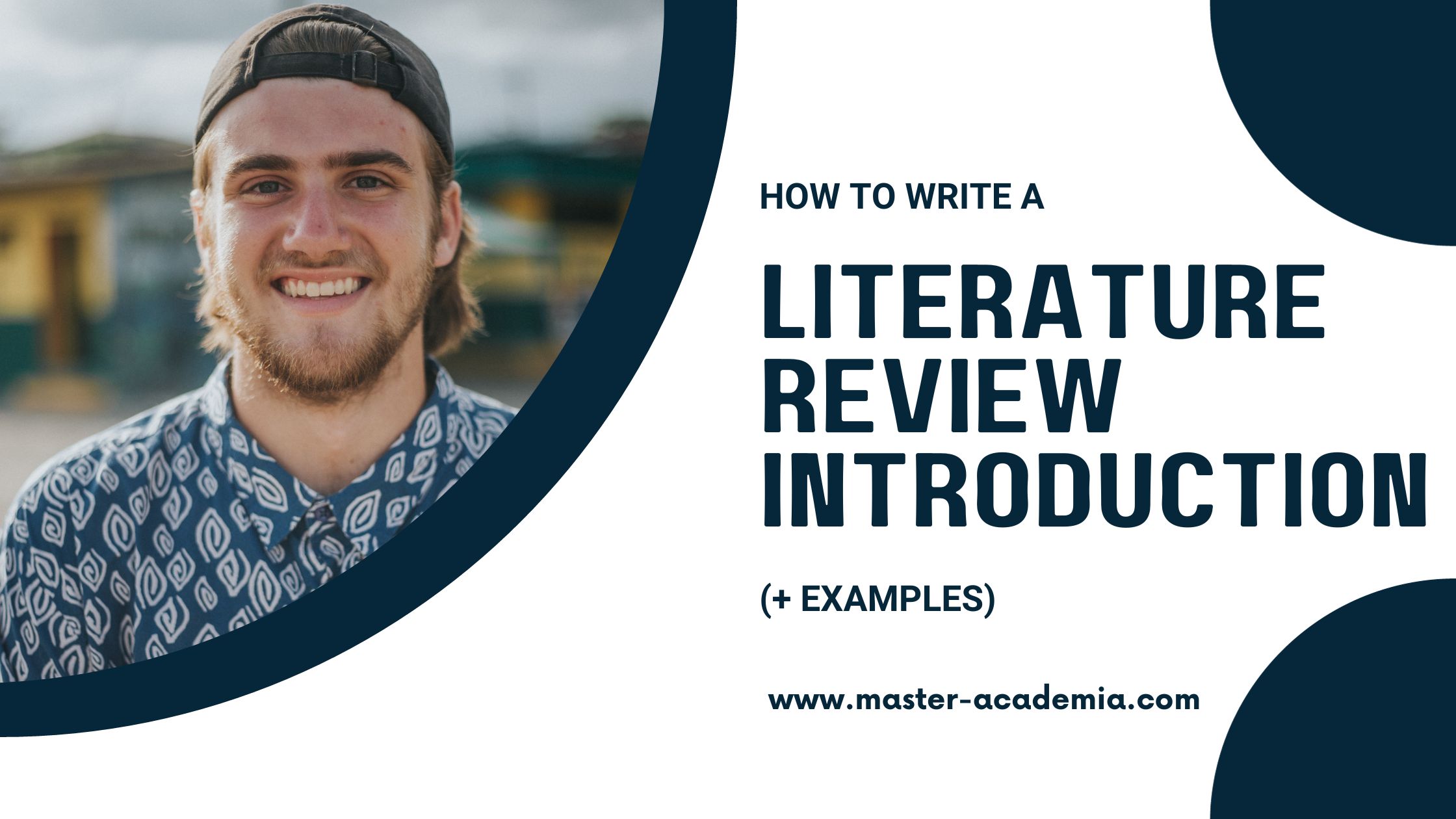
How to write a literature review introduction (+ examples)

- Acknowledgements for PhD Thesis and Dissertations – Explained
- Doing a PhD
The Purpose of Acknowledgements
The acknowledgement section of a thesis or dissertation is where you recognise and thank those who supported you during your PhD. This can be but is not limited to individuals, institutions or organisations.
Although your acknowledgements will not be used to evaluate your work, it is still an important section of your thesis. This is because it can have a positive (or negative for that matter) influence the perception of your reader before they even reach the main body of your work.
Who Should I Acknowledge?
Acknowledgements for a PhD thesis will typically fall into one of two categories – professional or personal.
Within these categories, who you thank will ultimately be your decision. However, it’s imperative that you pay special attention to the ‘professional’ group. This is because not thanking someone who has played an important role in your studies, whether it be intentional or accidental, will more often than not be seen as a dismissal of their efforts. Not only would this be unfair if they genuinely helped you, but from a certain political aspect, it could also jeopardise any opportunities for future collaborations .
Professional Acknowledgements
This may include, but is not limited to:
- Funding bodies/sponsorship providers
- Supervisors
- Research group and lab assistants
- Research participants
- Proofreaders
Personal Acknowledgements
- Key family members and friends
- Individuals who inspired you or directly influenced your academic journey
- Anyone else who has provided personal support that you would like to mention
It should be noted that certain universities have policies which state only those who have directly supported your work, such as supervisors and professors, should be included in your acknowledgements. Therefore, we strongly recommend that you read your university guidelines before writing this section of your thesis.
How to Write Acknowledgements for PhD Thesis
When producing this section, your writing style can be more informal compared to the rest of your thesis. This includes writing in first person and using more emotive language. Although in most cases you will have complete freedom in how you write this section of your thesis, it is still highly advisable to keep it professional. As mentioned earlier, this is largely because it will be one of the first things your assessors will read, and so it will help set the tone for the rest of your work.
In terms of its structure, acknowledgements are expected to be ordered in a manner that first recognises the most formal support before moving onto the less formal support. In most cases, this follows the same order that we have outlined in the ‘Who Should I Thank’ section.
When thanking professionals, always write out their full name and provide their title. This is because although you may be on a first-name basis with them, those who read your thesis will not. By providing full names and titles, not only do you help ensure clarity, but it could also indirectly contribute to the credibility of your thesis should the individual you’re thanking be well known within your field.
If you intend to include a list of people from one institution or organisation, it is best to list their names in alphabetical order. The exception to this is when a particular individual has been of significant assistance; here, it would be advisable to list them.
How Long Should My Acknowledgements Be?
Acknowledgements vary considerably in length. Some are a single paragraph whilst some continue for up to three pages. The length of your acknowledgement page will mostly depend on the number of individuals you want to recognise.
As a general rule, try to keep your acknowledgements section to a single page. Although there are no word limits, creating a lengthy acknowledgements section dilutes the gratitude you’re trying to express, especially to those who have supported you the most.
Where Should My Acknowledgements Go?
In the vast majority of cases, your acknowledgements should appear directly after your abstract and before your table of contents.
However, we highly advise you to check your university guidelines as a few universities set out their own specific order which they will expect you to follow.
Phrases to Help You Get Started

We appreciate how difficult it can be to truly show how grateful you are to those who have supported you over the years, especially in words.
To help you get started, we’ve provided you with a few examples of sentences that you can complete or draw ideas from.
- I am deeply grateful to XXX…
- I would like to express my sincere gratitude to XXX…
- I would like to offer my special thanks to XXX…
- I would like to extend my sincere thanks to XXX…
- …for their assistance at every stage of the research project.
- …for their insightful comments and suggestions.
- …for their contribution to XXX.
- …for their unwavering support and belief in me.
Thesis Acknowledgement Examples
Below are three PhD thesis acknowledgment samples from which you can draw inspiration. It should be noted that the following have been extracted from theses which are freely available in the public domain. Irrespective of this, references to any individual, department or university have been removed for the sake of privacy.
First and foremost I am extremely grateful to my supervisors, Prof. XXX and Dr. XXX for their invaluable advice, continuous support, and patience during my PhD study. Their immense knowledge and plentiful experience have encouraged me in all the time of my academic research and daily life. I would also like to thank Dr. XXX and Dr. XXX for their technical support on my study. I would like to thank all the members in the XXX. It is their kind help and support that have made my study and life in the UK a wonderful time. Finally, I would like to express my gratitude to my parents, my wife and my children. Without their tremendous understanding and encouragement in the past few years, it would be impossible for me to complete my study.
I would like to thank my supervisors Dr. XXX and Dr. XXX for all their help and advice with this PhD. I would also like to thank my sisters, whom without this would have not been possible. I also appreciate all the support I received from the rest of my family. Lastly, I would like to thank the XXX for the studentship that allowed me to conduct this thesis.
I would like to thank my esteemed supervisor – Dr. XXX for his invaluable supervision, support and tutelage during the course of my PhD degree. My gratitude extends to the Faculty of XXX for the funding opportunity to undertake my studies at the Department of XXX, University of XXX. Additionally, I would like to express gratitude to Dr. XXX for her treasured support which was really influential in shaping my experiment methods and critiquing my results. I also thank Dr. XXX, Dr. XXX, Dr. XXX for their mentorship. I would like to thank my friends, lab mates, colleagues and research team – XXX, XXX, XXX, XXX for a cherished time spent together in the lab, and in social settings. My appreciation also goes out to my family and friends for their encouragement and support all through my studies.
Browse PhDs Now
Join thousands of students.
Join thousands of other students and stay up to date with the latest PhD programmes, funding opportunities and advice.
Reference management. Clean and simple.
Dissertation acknowledgments [with examples]
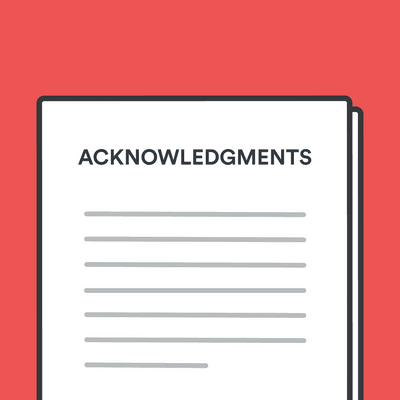
What are dissertation acknowledgements?
What to consider when writing your dissertation acknowledgments, who to thank in your dissertation acknowledgments, what (and what not) to write in your dissertation acknowledgments, good examples of dissertation acknowledgments, a final word on writing dissertation acknowledgments: have fun, frequently asked questions about dissertation acknowledgments, related articles.
While you may be the sole author of your dissertation, there are lots of people who help you through the process—from your formal dissertation advisors to the friends who may have cooked meals so that you could finish your last chapter . Dissertation acknowledgments are a chance to thank everyone who had a hand in the completion of your project.
Dissertation acknowledgments are a brief statement of your gratitude to advisors, professors, peers, family, and friends for their help and expertise.
In this guide, we’ll cover:
- the most important things to consider when you’re writing your dissertation acknowledgments
- who to thank in your dissertation acknowledgments
- what (and what not) to write in your dissertation acknowledgments
- short examples of dissertation acknowledgments
Once you’re at the stage where you’re writing your dissertation acknowledgments, you may be tempted to kick back and relax. After all, the hard part of writing the dissertation itself is over and a list of thanks should be simple to churn out.
However, the acknowledgments are an important part of your overall work and are something that most people who read your dissertation, including prospective employers, will look at.
Tip: The best dissertation acknowledgements are concise, sincere, and memorable.
Approach this part of the process, brief as it may be compared to the long haul of writing the dissertation, with the same high level of care and attention to detail. It’s an explicit and permanent statement of who made a real impact on your work and contributed to your academic success.
Plus, the people you thank are often deeply moved by being included—some even go so far as to frame the acknowledgments. Aim to make yours sincere, memorable and something that people will be touched by.
First things first: who should you include in your dissertation acknowledgments? If you’re not sure who to thank, try the brainstorming technique to generate some ideas. Consider these two approaches:
- Make a list of everyone, both professional and personal, who was involved at any point during your work on your dissertation, and then thin down the list from there.
- Make a list of the pivotal aspects of your process and think about who was involved and how they helped.
As you select the people and groups to include in your dissertation acknowledgments, keep in mind that it’s essential to acknowledge your supervisor and anyone else with a visible connection to your work.
It’s an unfortunate reality that not every supervisor goes above and beyond to provide feedback and guidance to the students they are supposed to supervise. However, leaving them out, even if you personally felt disappointed by their involvement or lack thereof, could be seen as a snub.
You should end up with a fairly short list of people to thank. While being mindful of professional etiquette and personal feelings, be choosy about who makes the final cut since your acknowledgments should be limited to no more than a page.
Now that you have your list of people and groups to thank, it’s time to start writing. Before your first pen or keystroke, however, check your university’s guidelines as your institution may have specific rules around what can and cannot be included.
The standard practice is to begin with the formal and then progress to the informal, so the first people to mention would be:
- supervisors
- committee members
- other professional contacts
Use their full names and titles and go into brief detail about how they contributed to your work.
Once those are done, you can move on to the personal thanks, which can include friends, family, even pets. If you are so inclined, it is also considered appropriate to thank God or make mention of spiritual support.
You may also choose to inject a little humor at this point, but don’t get carried away and definitely don’t include sarcasm or critical comments of any kind, including self-critical ones. Remember that the acknowledgments precede your dissertation, so you want to be taken seriously.
A couple more basics that are essential when creating your acknowledgments:
- Position: Acknowledgments should be placed after the title page and before the abstract.
- Perspective: Write from the first-person perspective and speak in your own voice.
A really good way to get a sense of how to write your own dissertation acknowledgments is to read ones written by others. Notice which ones you respond particularly well to and use them as a model upon which to base your own.
Here are some good examples to help you get started:
I couldn’t have reached this goal without the help of many people in my life. I’d like to take this opportunity to thank them for their support.
First, my sincere thanks to my dissertation committee. The value of their guidance cannot be overstated. Dr. Elaine Gooding and Dr. Matthew Hunter provided much wisdom that helped me chart my course. I couldn’t have asked for a better supervisor than Dr. Fiona Moore, whose knowledge and experience guided me every step of the way.
Next, I’d like to thank my partner, Elliott. Your votes of confidence kept me going when my spirits dipped. I couldn’t have done this without you.
Last but not least, I’d like to acknowledge the emotional support provided by my family and friends. We made it to the top of the mountain! I look forward to celebrating with all of you.
This example is shorter, but still contains the key components:
Several people played a decisive role in my success and I would like to take this opportunity to thank them.
My chair, Dr. Ronald Saulk, provided invaluable support and infinite patience and I am truly grateful for all of his wisdom and guidance. I also owe the entire staff of the Wilhelm Library a debt of gratitude. From tracking down books and arranging for interlibrary loans to keeping the coffee maker in the lobby well-stocked and in good working order, they offered the practical help and kind gestures that made all the difference.
I’d also like to thank my family and God, for always being there for me.
One final piece of advice: enjoy this process. Writing a dissertation doesn’t happen every day, and the opportunity to acknowledge the important people in your life in a published format is as rare as it is wonderful.
What’s more, this part of your dissertation is unlike any other. It’s unbounded by the conventions that apply to the formal work. It’s a chance to really flex some creative muscle and let your personality shine through. So make the most of it and have fun!
In your dissertation acknowledgments, you thank everyone who has contributed to your work or supported you along the way. Who you want to thank is a very personal choice, but you should include your supervisors and anyone else with a visible connection to your work. You may also thank friends, family, and partners.
First, you need to come up with a list of people you want to thank in your dissertation acknowledgments. As a next step, begin with the formal and then progress to the informal, so the first people to mention would be supervisors, mentors, committees, and other professional contacts. Then, you can move on to the personal thanks, which can include friends, family, even pets.
Who you acknowledge in your dissertation is ultimately up to you. You should, however, thank your supervisor and anyone else with a visible connection to your work. Leaving them out, even if you personally felt disappointed by their involvement or lack thereof, could be seen as a snub. In addition, you can thank friends, partners or family.
There are many ways so you can acknowledge your dissertation supervisor. Some examples can be found in this article above. If you need more examples, you can find them here .
While acknowledgments are usually more present in academic theses, they can also be a part of research papers. In academic theses, acknowledgments are usually found at the beginning, somewhere between abstract and introduction. In research papers, acknowledgments are usually found at the end of the paper.
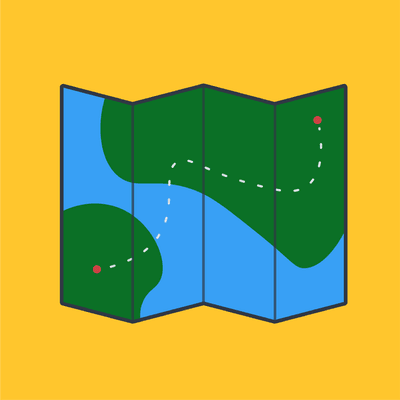

Acknowledgement Sample For Undergraduate Thesis|12 Best Samples
Last updated on May 17th, 2024 at 05:03 pm
“Explore a comprehensive acknowledgement sample for undergraduate thesis, providing insights into expressing gratitude and recognition for support received during the academic journey.”
When it comes to writing acknowledgements for your bachelor’s thesis, it’s important to express gratitude to those who have supported you throughout your journey. This includes your supervisors, committee members, colleagues, friends, and family. Here’s a simplified version of an acknowledgement section with tips and headings to guide you through the process.
Table of Contents
List Of Writing Acknowledgement Sample For Undergraduate Thesis
- Tips for Writing Acknowledgments
Acknowledgement Examples
Academic mentorship acknowledgement, committee recognition, inspirational faculty appreciation, collaborative research acknowledgement, professional support recognition, personal support gratitude, colleague appreciation, family support acknowledgement, grandparent appreciation, parental guidance acknowledgement, sibling support recognition, tips for writing acknowledgments:.
- Be Genuine: Express your gratitude sincerely and genuinely to those who have supported you.
- Be Specific: Mention individuals by name and briefly explain how they contributed to your thesis.
- Be Concise: Keep your acknowledgments section brief and to the point, focusing on the most significant contributors.
- Be Professional: Maintain a professional tone and avoid overly personal or informal language.
- Include Everyone: Don’t forget to thank all those who have helped you, both academically and personally.
I extend my sincere appreciation to my academic mentors, [Ms. Name Surname] , [Mr. Name Surname] , and [Ms. Name Surname] , for their invaluable guidance and support throughout my thesis journey. Their expertise and encouragement have been instrumental in shaping my research and academic growth. Without their dedication, this thesis would not have reached its full potential. I am truly grateful for the opportunity to learn from such esteemed scholars, and I will carry the lessons they imparted with me throughout my academic and professional career.
I would like to express my gratitude to the members of my thesis committee, including [Ms. Name Surname] , [Ms. Name Surname] , [Ms. Name Surname] , [Mr. Name Surname] , and [Ms. Name Surname] . Their insightful feedback and constructive criticism have significantly enriched the quality of my work. Their commitment to academic excellence has inspired me to strive for greater heights in my research endeavors. I am truly fortunate to have had such distinguished scholars guide me through this academic journey, and I am indebted to them for their unwavering support.
Special thanks to [Ms. Name Surname] , whose passion for teaching [subject] at [Name] University has inspired me. I am also grateful to [Mr. Name, Surname] for his valuable contributions to my academic journey. Their dedication to their craft and their students has left a lasting impression on me. I am thankful for the knowledge and guidance they have shared, which have undoubtedly shaped my intellectual growth. Their mentorship has instilled in me a deeper appreciation for learning and a commitment to excellence.
My research at [Name] University was greatly enhanced by the collaboration with [Ms. Name, Surname] . I am thankful for her mentorship and the opportunity to work on impactful projects together. Her insights and expertise have played a crucial role in shaping the direction of my research. Together, we have overcome challenges and achieved significant milestones, and I am grateful for her unwavering support throughout this collaborative endeavor. I look forward to continuing our partnership in future research endeavors.
I extend my appreciation to [Mr. Name Surname] for his expertise in statistical analysis , which greatly contributed to the quality of my dissertation. His patience and guidance were invaluable during the research process. Without his assistance, navigating the complexities of data analysis would have been far more daunting. I am grateful for his willingness to share his knowledge and expertise, which has been instrumental in shaping the analytical framework of my thesis. His contributions have significantly strengthened the validity and rigor of my research findings.
To my dear friends [Name Surname] , [Name Surname] , and [Name Surname] , thank you for being my pillars of strength throughout this academic journey. Your unwavering support and encouragement kept me motivated during challenging times. From late-night study sessions to moments of self-doubt, you were always there to uplift me and remind me of my capabilities. I cherish the memories we’ve shared and the bonds we’ve formed, and I am immensely grateful for your friendship. Your belief in me has been a driving force behind my success, and I look forward to celebrating many more achievements together in the future.
More To Read | Acknowledgement Letter Sample For A Great Customer Service|9+ Samples
Acknowledgement Letter Sample For Order Cancellation|12 Best Samples
I am grateful to my colleagues [Name Surname] , [Name Surname] , and [Name Surname] for their collaboration and camaraderie. Your insights and camaraderie enriched my academic experience. Whether brainstorming ideas or providing feedback, your contributions have been invaluable. I appreciate the collaborative spirit that defined our interactions and the collective effort we put into supporting each other’s academic pursuits. Together, we’ve overcome challenges and celebrated successes, and I am thankful for the sense of community we’ve built.
Friendship Acknowledgement
My heartfelt thanks to all my friends for their continuous support and encouragement. Special gratitude to [Name Surname] and [Name Surname] for being my confidants and cheerleaders during this thesis journey. Your unwavering belief in me, even during moments of self-doubt, has been a source of strength. I am grateful for the laughter we’ve shared, the memories we’ve created, and the unwavering support you’ve provided. Your friendship is a treasure that I hold dear, and I am thankful for your presence in my life.
I owe a debt of gratitude to my family for their unwavering love and support. To my parents, [Name Surname] , and my sister, [Name Surname] , thank you for believing in me and standing by my side through thick and thin. Your sacrifices and encouragement have been the cornerstone of my success, and I am profoundly grateful for your unwavering belief in my abilities. I am blessed to have such a loving and supportive family, and I cherish the bond we share.
I am deeply grateful to my grandmother, [Name, Surname] , whose constant encouragement and wisdom have been a source of inspiration. Her unwavering belief in my abilities has fueled my determination to succeed. From her words of wisdom to her warm embrace, she has always been my guiding light. I am thankful for the love and support she has showered upon me throughout my academic journey. Her presence in my life is a source of strength and comfort, and I am blessed to have her as my grandmother.
To my parents, [Name, Surname] , thank you for your endless sacrifices and unwavering support. Your guidance and encouragement have shaped me into the person I am today, and I am forever grateful. From instilling in me a love for learning to providing a nurturing environment for my academic pursuits, you have been my greatest champions. Your belief in my abilities has propelled me forward during moments of doubt, and your unwavering faith in me has been a source of strength. I am profoundly grateful for the sacrifices you’ve made to ensure my success, and I hope to make you proud in all my endeavors.
Lastly, I want to express my appreciation to my sister, [Name, Surname] , for her unwavering support and encouragement. Her belief in my abilities has been a constant source of motivation throughout this academic journey. From lending a listening ear to offering words of encouragement, she has always been there for me. I am grateful for the bond we share and the unwavering support she has provided, even in the face of her own challenges. Together, we have weathered the storms and celebrated the victories, and I am thankful for her presence in my life.
How do you start an acknowledgements section of a thesis?
To begin the acknowledgements section of a thesis, start by expressing gratitude to those who have contributed to your academic journey and thesis project. You can mention your supervisors, committee members, mentors, family, and friends who have supported you along the way.
How do you start an acknowledgement?
To start an acknowledgment, begin by expressing gratitude to those who have helped and supported you. This could include mentors, family members, friends, colleagues, and anyone else who has made a positive impact on your academic or personal life.
What is acknowledgement in a thesis paper?
An acknowledgment in a thesis paper is a section where the author expresses gratitude to individuals or groups who have provided support, guidance, or assistance during the research and writing process. It is a way to recognize and thank those who have contributed to the completion of the thesis.
What should be included in the acknowledgement of research?
In an acknowledgement of research, you should include the names of individuals or groups who have contributed to your work, along with a brief statement expressing your appreciation for their support, guidance, or assistance. It’s important to be sincere and specific in your acknowledgments, mentioning the roles each person played in your research.
What is the basic acknowledgement statement?
The basic acknowledgment statement typically starts with expressions of gratitude, such as “I would like to thank…” or “I am grateful to…” followed by the names of individuals or groups being acknowledged. It may also include a brief description of their contributions and the impact they had on the research or project.
What is an example of acknowledgement and dedication in research?
An example of an acknowledgment in research could be: “I would like to express my sincere gratitude to my supervisor, Dr. Smith, for his invaluable guidance and support throughout this research project. I am also thankful to my family for their unwavering encouragement and understanding during this time.”
How do you write an acknowledgement for an assignment in college?
To write an acknowledgement for an assignment in college, start by expressing gratitude to your instructor for their guidance and feedback. You can also thank classmates, friends, or family members who provided support or assistance during the assignment. Be sure to mention specific ways in which they helped you and express genuine appreciation for their contributions.
In conclusion , the acknowledgments section of a thesis or research paper serves as a heartfelt expression of gratitude to those who have supported and guided the author throughout their academic journey. It is a tribute to the individuals who have played a significant role in the completion of the project, including supervisors, mentors, family, and friends .
By acknowledging their contributions, the author not only shows appreciation but also recognizes the collaborative nature of academic endeavors. The acknowledgment section serves as a reminder of the importance of community and support in achieving academic success. Ultimately, it is a testament to the collective effort and encouragement that shape scholarly pursuits and contribute to personal growth and achievement .
I’m Matthew Porter , the creative mind behind “ Acknowledgment Templates .” I’ve had a blast creating templates that capture the essence of gratitude in acknowledgment sections. At Acknowledgment Templates, we’re all about turning appreciation into a well-crafted art. Let’s make your acknowledgment section a masterpiece—join me in the creative process at Acknowledgment Templates!
Leave a Comment Cancel reply
Save my name, email, and website in this browser for the next time I comment.
I'm Dariel Campbell , the expert helping you navigate acknowledgment sections at " Acknowledgment Templates ."
Playing with words and expressions is my thing. At Acknowledgment Templates, we're here to make your acknowledgment stand out and shine.
Let's make your appreciation heartfelt and memorable—come and join the fun at Acknowledgment Templates!
Recent Posts

Acknowledgement For Art Integrated Project |Best Examples
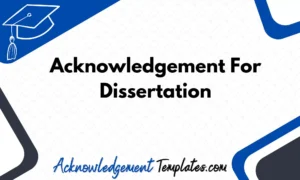
Acknowledgement For Dissertation|12+Best Samples
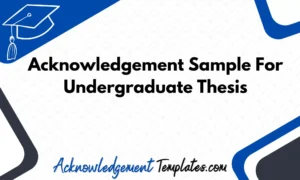
Acknowledgement Letter Sample For A Great Customer Service|9+ Samples
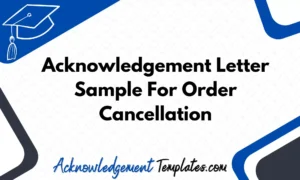
Sample Of Acknowledgement For The Ngo Project Report|10+ Samples

Order Acknowledgement| How to write full guide

What To Write In Acknowledgement?|Best Examples
Make your acknowledgment stand out and shine
Privacy Policy
Latest Articles

March 23, 2024

© 2024 Acknowledgement Templates
Academia Bees
Best Acknowledgement for Dissertation (10 Samples and Guide)
January 15, 2024
No Comments
By Mohsin Khurshid
Embark on a journey through the art of crafting heartfelt acknowledgments for your dissertation. Explore examples and a comprehensive guide on acknowledging those who made your project possible. Uncover the best practices in expressing gratitude, from family to mentors.
Table of Contents
- 1.1 Acknowledgement for Dissertation
- 1.2 Dissertation Acknowledgement Sample
- 1.3 Acknowledgement for Dissertation Paper
- 1.4 Acknowledgement Sample for Dissertation
- 1.5 Acknowledgement in Dissertation to Family
- 1.6 Acknowledgement for Masters Dissertation
- 1.7 Undergraduate Dissertation Acknowledgements
- 1.8 Dissertation Acknowledgements Funny
- 1.9 Example of Dissertation Acknowledgement to God
- 1.10 Sample Acknowledgement for Dissertation File
- 2 How to Write Acknowledgement for Dissertation:
- 3 Conclusion
Ten Best Samples of Acknowledgement for Dissertation Project
Discover diverse examples showcasing gratitude in dissertation acknowledgments. Explore samples ranging from traditional expressions to unique acknowledgments for family, masters, and even humorous takes. Find inspiration for your own heartfelt acknowledgment.
Acknowledgement for Dissertation
I express my deep appreciation to my advisor for their unwavering guidance in shaping this dissertation. Their expertise and encouragement were vital throughout the research journey. Gratitude extends to my family, whose unwavering support made this academic endeavor possible.
I also acknowledge the contributions of colleagues and friends, creating a collaborative atmosphere that enriched my work. This acknowledgment is a heartfelt tribute to those who played a pivotal role in the success of this dissertation.
Dissertation Acknowledgement Sample
My sincere gratitude goes to all who contributed to this dissertation. Special thanks to my advisor, whose mentorship was invaluable. The support from family, friends, and colleagues created an uplifting environment. This acknowledgment is a token of appreciation to those who stood by me.
Each contributor, whether big or small, has left an indelible mark on this academic journey, and for that, I am truly thankful.
Acknowledgement for Dissertation Paper
In expressing gratitude for this dissertation, my heartfelt thanks go to my advisor for their continuous support and guidance. The collaborative efforts of colleagues and friends added depth to the research. Special acknowledgment is due to family, whose unwavering support sustained me.
This dissertation acknowledgment is a tribute to the combined efforts that made this academic endeavor possible.
Acknowledgement Sample for Dissertation
This acknowledgment is a sincere expression of gratitude to my advisor, mentors, and peers who contributed significantly to the completion of this dissertation. Their unwavering support, valuable insights, and encouragement have been pivotal in shaping the project.
I extend special thanks to [Advisor’s Name] for their guidance and patience, which made this journey a rewarding experience. This acknowledgment is a token of appreciation for the collaborative effort that made this dissertation possible.
Acknowledgement in Dissertation to Family
In the completion of this dissertation, my family has been a pillar of support and encouragement. Their unwavering belief in my capabilities and understanding during challenging times were instrumental. This acknowledgment extends heartfelt thanks to [Family Members’ Names] for their constant encouragement and unwavering support. Their role in this academic endeavor goes beyond words, and I am deeply grateful for their presence throughout this journey.
Acknowledgement for Masters Dissertation
Completing this master’s dissertation wouldn’t have been possible without the support and guidance of [Advisor’s Name]. Their mentorship and expertise played a crucial role in shaping this academic work.
I also extend my thanks to [Mention Other Contributors] for their contributions. This acknowledgment is a reflection of the collaborative effort that went into the successful completion of this master’s dissertation.
Undergraduate Dissertation Acknowledgements
Completing my undergraduate dissertation was a journey marked by invaluable support from various corners. I express my deep gratitude to my advisor for their guidance and patience throughout the process. Thanks are also due to [Mention Other Contributors], whose insights enriched my research.
The support from friends and family played a crucial role in navigating the challenges. This acknowledgment is a tribute to the collective effort that made my undergraduate dissertation a reality.
Dissertation Acknowledgements Funny
Embarking on the serious task of dissertation writing, a touch of humor lightens the load. Special thanks to my caffeine companion, coffee, for being a constant ally during those late-night writing sessions. Gratitude to my computer for not crashing during critical moments.
Humorous acknowledgment goes to [Include Something Funny], who brought laughter to the stressful times. This funny dissertation acknowledgment is a lighthearted nod to the quirks and challenges that made the academic journey memorable.
Example of Dissertation Acknowledgement to God
In completing this dissertation, I humbly acknowledge the divine guidance of God. My gratitude extends to the Almighty for providing strength, wisdom, and inspiration throughout this academic journey.
The acknowledgment to God is a heartfelt expression of faith, recognizing the unseen hand that guided me in moments of doubt and challenge. This dissertation stands as a testament to the divine support that made the impossible possible.
Sample Acknowledgement for Dissertation File
As I present this dissertation file, I express my sincere appreciation to all who contributed to its creation. Special thanks to my advisor and mentors for their guidance. This acknowledgment extends to family, friends, and colleagues whose support shaped this document. The acknowledgment for the dissertation file is a recognition of the collaborative effort that turned ideas into written words.
It’s a token of gratitude to those who played a role, big or small, in bringing this document to completion.
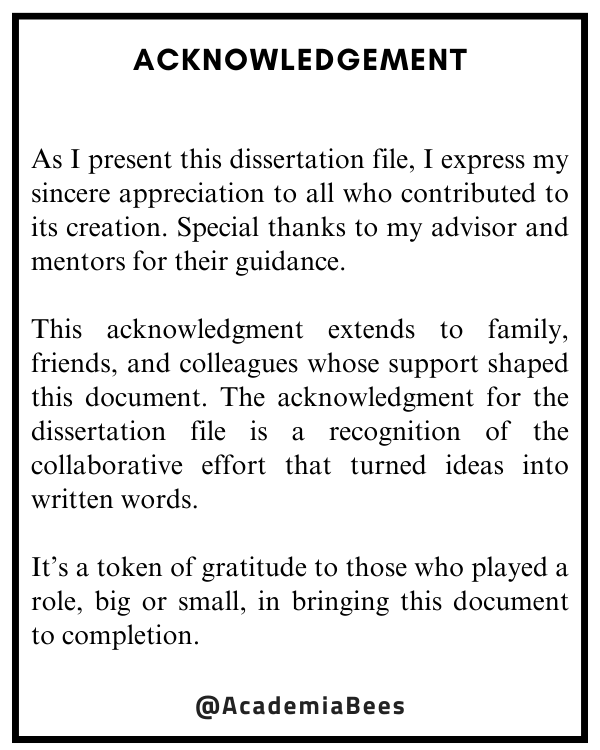
How to Write Acknowledgement for Dissertation:
Crafting an effective dissertation acknowledgment involves thoughtful consideration of those who contributed to your academic journey. Begin with a genuine expression of gratitude to those who played significant roles:
1. Primary Advisor:
Start with your primary advisor. Acknowledge their guidance, support, and mentorship.
2. Thesis Committee:
Extend gratitude to other committee members . Recognize their valuable insights and contributions.
3. Academic Mentors:
Acknowledge mentors, professors, or colleagues who provided guidance and support.
4. Fellow Students:
Include fellow students for their camaraderie and shared academic experiences.
5. Family and Friends:
Express appreciation for the unwavering support of family and friends. Acknowledge their understanding and encouragement.
6. Institutions or Funding Sources:
If applicable, acknowledge any institutions, organizations, or funding sources that supported your research.
7. Colleagues or Collaborators:
Recognize any collaborators or colleagues who contributed to the project.
8. Professional Contacts:
If relevant, include professionals in the field who provided assistance or insights.
When structuring your acknowledgment, consider starting with the most influential contributors, such as your primary advisor and committee members. Progress to those who played supporting roles, ensuring that each acknowledgment is sincere and specific. Use warm and appreciative language, keeping the acknowledgment concise and focused on those directly related to the dissertation.
In crafting your dissertation acknowledgments, draw inspiration from these examples. Express gratitude thoughtfully to create a meaningful acknowledgment section that reflects the collaborative spirit of your academic journey.
Acknowledgement for PhD Thesis (5 Samples and Guide)
Leave a comment cancel reply.
Save my name, email, and website in this browser for the next time I comment.

Dissertation Acknowledgement Examples - 8+ Examples
Thomas Babb
If you’re getting ready to write your dissertation acknowledgement, first of all, congratulations! Writing any thesis is an arduous process, one which you’re nearing the end of. Dissertation acknowledgement examples vary in length and style, mainly due to the fact that you can personalise them to whatever extent you want.
Your dissertation acknowledgement will likely be one of the very last things you write during your dissertation . After you’ve done the brunt of the hard work on actually getting everything down on paper, you now have the challenge of thanking people. Especially for us Brits, this can be a fairly awkward affair, as you don’t want to come off as too ridiculous.
If you’re looking for a helping hand, you’ve come to the right place. We’ll walk you through the main questions to ask yourself when writing your thesis acknowledgements. We’re going to touch upon what the acknowledgement is, different types you could write, who you should include, and even a few perfect dissertation acknowledgement examples to get you started.
You’ll be signing off on your dissertation in no time!
What is a Dissertation Acknowledgement?
An acknowledgement section of your thesis will include a personal thank you to anyone who has helped you along your writing process. This could include personal relations, like a partner or a friend. More commonly, a dissertation acknowledgement will focus on academic help that you’ve had along the way. From professors to lab technicians, this is your moment to give thanks for the hard work everyone has put in.
No one writes a dissertation completely by themselves. While you might have done the heavy academic lifting in coming up with an idea and carrying it through to the end, that doesn’t mean that you’ve been in isolation for the whole process. Normally, there’s someone - or many people - that you want to thank. Some famous dissertation acknowledgement examples even focus on someone’s dog or cat.
Remember, this is your dissertation, you can really thank whoever you want. Just a small warning before you begin writing, be sure to double-check your institution’s guidance. Some universities have specific guidelines for writing acknowledgements. Be sure to look out for anything you can’t include, as well as general guidance for word counts.
But, at the end of the day, this is your piece of writing. While we always suggest you follow recommended guidelines, you can do what you want with your dissertation. Just remember that you can’t change this once submitted, so it's good to be sure you’ve included everyone you want to be mentioned the first time around.
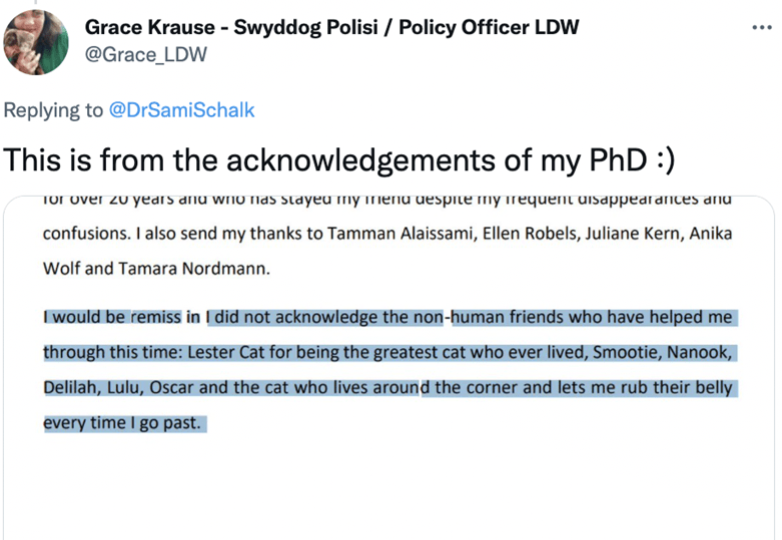
Professional and Academic Acknowledgements in a Dissertation
No dissertation is completed in isolation. From people who read through your work to academic supervisors who guided you through the project, there are plenty of people to thank. Use your dissertation acknowledgements to give thanks to these people. When naming, be sure to stick to full names and titles.
After a lengthy writing process, it’s likely that you’re on a first-name basis with your supervisor. However, it’s good practice to use their title and full name to credit them.
There is no hard or fast rule in this section, but be sure to give thanks to those people that really helped you out. Consider mentioning:
- Dissertation supervisors - These are the people that have guided you through the whole process. Without them and their help, you might not have ended up with such a strong final piece of work. Out of absolutely everyone, these people are the ones that are most commonly thanked in dissertation acknowledgement examples.
- Academic staff who directly contributed to the project, perhaps lab technicians or your research group - Don’t forget about people who were there for you. Not everyone has to be a fundamental piece of the puzzle, but the fact that they helped you should metric a line or two in your thesis acknowledgements.
- Colleagues that helped you in your research or proofread your project - Friends often help you in more ways than one during your academic research. From actively helping in your project by providing guidance or proofreading to maybe just being there when you needed it, friends go a long way. Be sure to name-drop those that were there for you.
One important factor to take into account is that if you have received any funding, you should credit them as well. Even if it’s only one sentence, it’s important to pay thanks to the benefactors of your project.
Consider concluding with, “I give additional thanks to X Foundation, which granted me the opportunity to undertake this study”. This also applies to the university that you’re working under, it’s always a good idea to give thanks to your own institution.
These are slightly more formal requirements, but will almost always appear in professional dissertation acknowledgement examples for this reason.
Personal Acknowledgements in a Dissertation
Your thesis also provides an opportunity to acknowledge your close circle, giving thanks to the important people in your life who got you through it. Although writing a master’s thesis, PhD thesis, or dissertation thesis is an academic process, the mental side also requires support.
Take this as an opportunity to thank the people who made the process any easier for you. Once again, it’s unlikely that you did the whole process in complete isolation. Even if these people didn’t actively help with your work, it’s important to note that they could have helped on the mental side.
From taking a break to go for a drink with your friends to talking through the emotional weight of completing your dissertation project with your partner, being around people can help in more ways than one. If you benefitted from their help, be sure to thank:
- Your partner
- Close friends that supported you through the process
- Your family
Across these categories, you should devote a paragraph or two to giving out some praise. Remember, these people were there for you. The least you can do is mention them by name in the final draft of your thesis!
Improve your grades with TutorChase
The world’s top online tutoring provider trusted by students, parents, and schools globally.
4.92 /5 based on 480 reviews
How to Write a Dissertation Acknowledgement
Now you know who you’re going to mention, it’s time to get writing! There are some key things to remember. First of all, the style of writing should be more informal than the actual dissertation. Make sure to use the first person (I) and employ emotive language where you can. You want to make sure you show your gratitude!
When mentioning names, there are two styles you can follow. The first of these is to move through alphabetical order. This keeps everything in an easy-to-read fashion, while also avoiding any semblance of bias.
However, you could also opt for giving thanks in order of importance. Of course, some people are more essential in your project than others. Your acknowledgements could reflect this by starting with the person who has helped you most. Your supervisor would be a good place to begin.
Although there is no hard and fast rule when discussing acknowledgement length, it’s a good idea to keep it under one page. This will be the first thing your examiners read when working through your thesis. Due to this, it’s best to get straight to the point, thank who you need, and move onto the project!
Once again, we want to make sure you know that you can structure or handle your dissertation acknowledgements in any way you would like. If you’re ready to show the love, make it a five-page letter. If you want to keep it short and sweet, a few sentences will do. It's always good to consult an English tutor to ensure your acknowledgements are clear, grammatically correct and well-written.
As we’ll show you now, dissertation acknowledgement examples come in all shapes and sizes.
Dissertation Acknowledgement Examples
Once you’ve worked out who you need to thank and the style you’re going to use, it’s time to get writing. If you’re still a little stuck, here are some examples from our senior Oxbridge tutors to get you going!
Dissertation Acknowledge Example One – Strictly Academic
I would like to give thanks to my supervisors, Dr. X and Prof. Y, for their enduring support and much-appreciated advice throughout my dissertation. Without their invaluable guidance, this project would not have been possible. The University of X Y Department also receives my deepest gratitude, with continual support, guidance and academic advice from the whole faculty, forming a treasured part of this dissertation. Finally, this project would not have taken place without the support of the X Foundation. I give my thanks to all involved.
Dissertation Acknowledge Example Two – Mixed Personal and Academic
First of all, I’d like to express my deepest gratuities to the X scholarship funded by the X for their ongoing support. I would also like to extend my thanks to Prof. X, who kept me on the right track while also ensuring the project was enjoyable and productive. I could not have done this without them. I have to also mention my family, without their constant love and support, I would not be in the position I am today.
If you need any help with crafting your acknowledgements section, be sure to reach out to one of our expert online tutors .
Dissertation Acknowledge Example Three
Thank you to Dr. X from the University of Y for their generosity during my project. I’m boundlessly thankful for their help and guidance throughout the toughest stages of this dissertation.
Big thanks to my partner Z, who often brought me coffee and snacks while I was sitting in my chair for what seemed like hours. There’s no better soundboard than you, and I’m eternally grateful for all your support throughout this project.
Dissertation Acknowledge Example Four
We are grateful for the prolonged support of Dr X, professor in Y at the University of Z. Without their help, guidance, useful comments, and suggestions, we would not have ended up with a well-versed piece of writing. To Mrs X, who helped to edit and critique our work, we extend a big thank you.
To all of the many colleagues that persuaded us to follow this line of inquiry and provided us with a continual course of constructive criticism. It would be difficult to name them all, but we extend our thanks to everyone that was involved in our project.
Of course, we cannot end our acknowledgements without thanking our partners. Their insight and guidance were the shining light that beckoned us through our research project.
Finally, we turn to the department of X at the university of Y for their countless hours of support across our extended education.
Dissertation Acknowledge Example Five - Itemised List of Contributors.
I am very grateful to the entire network of members that participated in this project:
Professor X (University of Y), Professor X (University of Y), Professor X (University of Y), Name Last Name (University of Y), Professor X (University of Y), Name Last Name (University of Y), and of course, Professor X (University of Y).
A special thanks goes out to Professor X (University of Y), who was the lead supervisor on my thesis and to whom I owe a great deal of gratitude for their shining advice and constant compassion.
Dissertation Acknowledge Example Six
I am grateful to the entire Collective of Departments and the X team for giving me access to the Y resources that made this project possible. A big thanks goes out to Name Last name and Name Last name in particular, for the opportunity to work together on such an exciting project, one that has been near to my heart for quite some time.
Thanks to the X department for facilitating access to the collections and granting me permission to use images 4, 8, 15, 16, 23, and 42 across this research project. The showcase of artefacts and documents from the Y collections were also vital in this study, with my thanks going out to the team for allowing me to spend hours in their facilities.
A very special thanks to Professor X for helping to meticulously check my work, pointing out new directions for research and guiding me to a stronger final conclusion. Finally, I turn to my partner Y, without who I would never have been able to finish this dissertation.
To all those mentioned and those that have slipped my mind, I thank you.
Dissertation Acknowledge Seven - Short and Sweet
I would like to thank all contributors that added to this project, especially Prof. X, who was my main supervisor.
Dissertation Acknowledge Example Eight
The research behind this project was funded by the XYZ Institution. My first thanks goes to them for giving me the opportunity to conduct such a detailed investigation of this topic. Equally, I acknowledge the support given to me by the University of X, including the head of the department of Y, Dr. X Y. Their guidance and ongoing support for the last three years have turned a turbulent period in my life into one that I treasure.
I’m eternally grateful to those that contributed to this project. To my close friends, Name Name and Name Name, both of which I turned to when I was struggling getting pen to paper, I extend my thanks.
Of course, I could not have finished this dissertation without emotional support from my partner, Name Name, who got me through the many ups and downs of the process.

Final Thoughts
No matter which dissertation acknowledgement example you end up using as your guide, the most important thing to remember is that you should fill the section with genuine gratitude. Whether you go all out or just write one or two lines, make sure to get in the people that really matter to you.
While finishing a dissertation is a time to rejoice and feel proud of yourself, you should also make sure you thank those that got you there. We also recommend that you check out our guide on how to write an acknowledgement for a dissertation , which includes some of the very best tips that you can turn to.
Need help from an expert?
Study and Practice for Free
Trusted by 100,000+ Students Worldwide
Achieve Top Grades in your Exams with our Free Resources.
Practice Questions, Study Notes, and Past Exam Papers for all Subjects!
Need Expert Help?
If you’re looking for assistance, get in touch with one of our expert tutors who will be able to provide you with the support you need for the university dissertation . We’ll be there every step of the way!

Professional tutor and Cambridge University researcher

Written by: Thomas Babb
Thomas is a PhD candidate at Oxford University. He served as an interviewer and the lead admissions test marker at Oxford, and teaches undergraduate students at Mansfield College and St Hilda’s College. He has ten years’ experience tutoring A-Level and GCSE students across a range of subjects.
Related Posts

How to Write an Acknowledgement for a Dissertation

A Complete Guide to Writing Your Dissertation

Applying to UK Universities as an IB Student

Hire a tutor
Please fill out the form and we'll find a tutor for you
- Select your country
- Afghanistan
- Åland Islands
- American Samoa
- Antigua and Barbuda
- Bosnia and Herzegovina
- Bouvet Island
- British Indian Ocean Territory
- Brunei Darussalam
- Burkina Faso
- Cayman Islands
- Central African Republic
- Christmas Island
- Cocos (Keeling) Islands
- Congo, The Democratic Republic of the
- Cook Islands
- Cote D'Ivoire
- Czech Republic
- Dominican Republic
- El Salvador
- Equatorial Guinea
- Falkland Islands (Malvinas)
- Faroe Islands
- French Guiana
- French Polynesia
- French Southern Territories
- Guinea-Bissau
- Heard Island and Mcdonald Islands
- Holy See (Vatican City State)
- Iran, Islamic Republic Of
- Isle of Man
- Korea, Democratic People'S Republic of
- Korea, Republic of
- Lao People'S Democratic Republic
- Libyan Arab Jamahiriya
- Liechtenstein
- Macedonia, The Former Yugoslav Republic of
- Marshall Islands
- Micronesia, Federated States of
- Moldova, Republic of
- Netherlands
- Netherlands Antilles
- New Caledonia
- New Zealand
- Norfolk Island
- Northern Mariana Islands
- Palestinian Territory, Occupied
- Papua New Guinea
- Philippines
- Puerto Rico
- Russian Federation
- Saint Helena
- Saint Kitts and Nevis
- Saint Lucia
- Saint Pierre and Miquelon
- Saint Vincent and the Grenadines
- Sao Tome and Principe
- Saudi Arabia
- Serbia and Montenegro
- Sierra Leone
- Solomon Islands
- South Africa
- South Georgia and the South Sandwich Islands
- Svalbard and Jan Mayen
- Switzerland
- Syrian Arab Republic
- Taiwan, Province of China
- Tanzania, United Republic of
- Timor-Leste
- Trinidad and Tobago
- Turkmenistan
- Turks and Caicos Islands
- United Arab Emirates
- United Kingdom
- United States
- United States Minor Outlying Islands
- Virgin Islands, British
- Virgin Islands, U.S.
- Wallis and Futuna
- Western Sahara

Still have questions? Let’s get in touch.
- What we check
- Proofreading jobs
- Terms & Conditions
- Privacy Policy
- Academic Proofreading
- Essay Proofreading
- Thesis Proofreading
- Dissertation Proofreading
- 3 Hour Proofreading Service
- 24 hour proofreading service
- 48 hour proofreading service
- PhD proofreading
- Personal statement proofreading
- Document formatting
- Proofreading Website
- Blog Proofreading
- Report Proofreading
- Novel editing services
- Book proofreading service
- Journal Article Editing
- Law Journal Formatting
14 Dissertation Acknowledgements Examples
Dissertation acknowledgements examples.
Here are 14 dissertation acknowledgements examples to inspire you. They cover a range of academic subjects and are all from UK students. Note how they vary in length, style and substance.
Note – all samples have been taken from documents available in the public realm.
Remember to always keep your acknowledgements to a maximum of a page .
So let’s dive right in!
Thank you to my supervisor, Dr Andrew R., for providing guidance and feedback throughout this project. Thanks also to my wife Anna, for putting up with me being sat in the office for hours on end, and for providing guidance and a sounding board when required.
I would like to thank the following people for helping with this research project: Representatives from Historic England, Historic Scotland, the Society for the Protection of Scottish Buildings and the Sustainable Buildings Alliance for their willingness to impart their knowledge. All the conservation officers and heritage team members who took the time to complete my questionnaire and who contributed so thoroughly through their further comments and emails. I would particularly like to thank those conservation officers who agreed to be interviewed. Brenda P., my tutor, who guided me so positively and who always made me feel confident in my abilities after coming off the phone to her. Jan W. for his help with statistics. My husband and children for their patience and encouragement.
I would like to thank the following people, without whom I would not have been able to complete this research, and without whom I would not have made it through my masters degree! The XYZ team at Johnson University, especially to my supervisor Dr Paul C., whose insight and knowledge into the subject matter steered me through this research. And special thanks to Linda T., whose support as part of her PhD allowed my studies to go the extra mile (sorry for all the extra work Linda!). The residents of Dundee, who took the time to return surveys and allowed me into your homes for follow up surveys, and without whom I would have no content for my thesis. My colleagues at the Old Building Trust and Old Building Foundation, who have supported me and had to put up with my stresses and moans for the past three years of study! And my biggest thanks to my family for all the support you have shown me through this research, the culmination of three years of distance learning. For my kids, sorry for being even grumpier than normal whilst I wrote this thesis! And for my wife Jenny, thanks for all your support, without which I would have stopped these studies a long time ago,. You have been amazing, and I will now clear all the papers off the kitchen table as I promised!
I would like to thank the following people who have helped me undertake this research: My supervisor Dr. Peter B., for his enthusiasm for the project, for his support, encouragement and patience; The Institute of Energy and Sustainable Development, Johnson University, for input throughout this MSc programme. For their contributions to data collection: David K at Tech David K, VS Limited Steven M Conal M., Engineer, County Council The good people of Brighton who were so generous with their time in completing the questionnaire surveys. My partner Billy – I simply couldn’t have done this without you, special thanks. Dear friends and family and Hattie. And to my parents, who set me off on the road to this MSc a long time ago.
I would like to thank Mr. Joe Smith for guiding me to his important publications and for the stimulating questions on artificial intelligence and automation. The meetings and conversations were vital in inspiring me to think outside the box, from multiple perspectives to form a comprehensive and objective critique.
First of all, I would like to express my sincere gratitude to Beauville Scholarships, the UK government’s global scholarship programme, funded by the Foreign and Commonwealth Office (FCO) and partner organisations, for letting me be part of this incredible leaders’ network. Further, I would like to thank my supervisor Alejandro for the thoughtful comments and recommendations on this dissertation. I am also thankful to the School of Engineering and all its member’s staff for all the considerate guidance. To conclude, I cannot forget to thank my family and friends for all the unconditional support in this very intense academic year.
I would like to thank my supervisor Prof. Mark W. and Liam H. for their consistent support and guidance during the running of this project. Furthermore I would like to thank the rest of the undergraduate research team for their collaborative effort during data collection. I would also like to acknowledge the school in Bradford for their participation and engagement in the study.
I would like to thank my supervisor Gina K. for her dedicated support and guidance. Gina continuously provided encouragement and was always willing and enthusiastic to assist in any way she could throughout the research project. I would also like to thank Andrew P. for providing advice regarding analysis.Finally, many thanks to all participants that took part in the study and enabled this research to be possible.
With many thanks to my supervisor Dr Martyn G. for his guidance during this research. To Jennie R., the dissertation module leader, for her support and encouragement throughout the process. Furthermore, to my mentor, Josh B. for providing access and introductions to women leaders, without this, the research would not have been possible. Finally, to all of the women who sacrificed their time, and the support of these well-known companies for their participation.
I would like to express my gratitude and appreciation for Barbara S. whose guidance, support and encouragement has been invaluable throughout this study. I also wish to thank the team an CIL who have been a great source of support.
Firstly, I’d like to express my thanks to my patient and supportive supervisor, Tao J., who has supported me throughout this research project. I am extremely grateful for our friendly chats at the end of our meetings and your personal support in my academic and business endeavours. I’d also like to thank my participants and customers who took the time to reflect on their consumption choices. Thank you for expressing your thoughts so eloquently and your feminism so unapologetically.
I would like to say a special thank you to my supervisor, Jennie R. Her support, guidance and overall insights in this field have made this an inspiring experience for me. I would also like to thank all of the women who participated in the study’s interviews. Finally, I would like to thank my family for supporting me during the compilation of this dissertation.
I would like to thank Rik B. for his continued support throughout this project. Guy R., through Dyesol and Philip L. for their SIM images of porous stone. I would also like to thank Dr. Steven M. for his advice throughout the project. Finally I would like to thank Maureen H. at the University of Freetown for allowing me to visit her and her explanation of various techniques.
From the bottom of my heart I would like to say big thank you for all the bioelectronics research group members for their energy, understanding and help throughout my project, especially to Mr D. N. for the guidance throughout the gel extraction, Mr Andrew L. for the help with AFM imaging and Mr Samuel D. H. for advice on the DNA analysis process. It truly has been very, very good time in this lab. I also would like to say special thank you to Professor P. W.and Dr R. S., without your help and wise guidance this project would have not been the same!
Visit our blog for more topics including Harvard referencing and Youtube
Rated 4.9/5 On Trustpilot…Read Our Reviews
Pay with debit/credit card with paypal or stripe.

100% Confidential
We take confidentiality seriously, read our privacy policy to find out how we keep your document safe and secure.
What our customers say
Read more…
Contact Us Today
Proofreading samples.
We are a professional UK proofreading and editing company and we use two proofreaders on every document. Our service goes beyond mere proofreading and includes editing for sentence structure, lexis, repetition and more.
- PhD proofreading service
- Dissertation proofreading
- Universities
Customer Support Hours:
Monday to Friday: 08:00-19:00
Saturday: CLOSED.
Sunday: CLOSED.
Copyright 2023 | London Proofreaders is a trading name of MK Media Limited, a company registered in England and Wales.
Terms & Conditions
- Bibliography
- More Referencing guides Blog Automated transliteration Relevant bibliographies by topics
- Automated transliteration
- Relevant bibliographies by topics
- Referencing guides
How to write acknowledgements for a thesis
Create a spot-on reference in APA, MLA, Chicago, Harvard, and other styles
What is an acknowledgement and what is its purpose.
The acknowledgement section is one of the sections of a bachelor’s or master’s thesis, dissertation, research paper, etc. destined to show your appreciation of the persons who took part in your research, contributed to your project, or provided any kind of support. In other words, this section is a way for the author to say a thank you to all those whose contribution they recognise as important.
How to write the acknowledgement section for a PhD thesis or dissertation
We are going to provide the basic guidelines below but please make sure to review the style guide of your university or department, as each institution might have some specific requirements as regards the contents and/or formatting of the acknowledgement section in your thesis.
So, here are several key recommendations for writing the acknowledgement section.
Whom to thank in the acknowledgement
This is up to you to decide whom to acknowledge. Select those persons who indeed contributed to your research or helped you perform your duties. In general, there are two main groups of persons to consider: professionals and personal acquaintances.
Professional acknowledgements
You can say a thank you to your:
- Thesis supervisor.
- Thesis opponents.
- Co-authors of your scientific papers.
- Research participants.
- Colleagues.
- Companies providing funding.
- Any other individuals or entities who anyhow contributed to the effective process of writing the dissertation.
Acknowledging the contribution of professionals is important from the perspective of academic integrity but also in terms of scientific ethics.
When addressing professionals, make sure to write their names in full and include their titles (e.g. associate professor at the Department…, PhD , etc.). This is important for identifying the contributors unequivocally. At the same time, it also makes your research look more credible and professional.
Personal acknowledgements
These include any persons other than professionals whom you would like to thank, e.g.:
- Parents or relatives (father/mother, grandparents, husband/wife, children, etc.).
- People who inspired or supported you.
Do not include any personal details, except the first name and last name (e.g. avoid giving the age, the place of living, etc.).
Language and style
The acknowledgement section differs from the rest of your PhD thesis, as it does not relate directly to the research, is addressing your readers, and thus can be less formal.
- Keep your language simple. Avoid complex and long phrases. Keep everything simple and straightforward.
- Your writing can be more informal. In the acknowledgement section, you can use more appealing and emotive language. Furthermore, you can use sentences in the first person (while you should use the impersonal or the passive form when presenting the results of your research in the body of your thesis).
- Remain within the academic framework. While the acknowledgement section is more informal, do not push too hard and remain within the framework of academic writing.
- Do not use dotted lists for names. Mention all the persons in sentences, do not present their names as dotted or numbered lists.
Length of the acknowledgement section
Your acknowledgement section should never be too long. As a rule, it should be at most 1 page. Do not try to overextend this section if less is sufficient for thanking your contributors.
Where to put the acknowledgement in the thesis
Most often, your acknowledgement goes after the abstract and before the table of contents or between the declaration and the table of contents. Please check the guidelines of your university or department.
Structure of the acknowledgement section
While it is up to you to choose (remember that your university might also have some guidelines for this), we can generally recommend the following structure for your acknowledgement:
- Brief introduction (one or a few sentences: why you are writing this section and why you need to acknowledge someone).
- Gratitude to your supervisor.
- Recognition of the other professional contributors.
- Recognition of personal supporters.
Thesis acknowledgement examples
Here are a few sample acknowledgements to give you an idea of how you can do it in your thesis.
Sample acknowledgement – supervisors
First and foremost, I would like to express my sincere gratitude to my supervisors who guided, instructed, and motivated me. Your feedback allowed me deepening and refining my research, and the results presented in my thesis would be impossible without your supervision.
Sample acknowledgement – companies and entities
I would like to acknowledge the financial and organisational support provided by Company X. I would also like to thank the Economics Department of University Y for the technical support.
Sample acknowledgement – individuals and relatives
Finally, I express my profound gratitude to my beloved husband James who continuously supported me, sacrificed his time, and always believed in me.
- Write the acknowledgement section in the end – once you have written the body of your thesis and have completed your research. This will allow avoiding redundant work.
- While the acknowledgement section is important, remember that the main part is the body of your thesis. In addition to running an in-depth research and achieve academic results, you also need to reference correctly the sources you have used. This is where Grafiati can help you: use our service to get perfect references, avoid unintentional plagiarism, and cite your sources correctly.
Other publications:
MHRA 4th vs. 3rd Edition: List of All Changes
MHRA 4th Edition Reference Generator (2024)
Manual de Citación Uniforme (Puerto Rico) reference generator
Top 10: The Most Cited Scientific Sources in 2023
Cell Style Easy Reference Generator
How to Properly Reference Software in a Research Paper?
ABNT NBR 10520:2023 online citation generator [NEW]
World pioneers: new citation styles added by Grafiati
ASCE reference generator
ASA (7th ed.) reference generator
New Zealand Law Style Guide (NZLSG) reference generator
AGLC (Australian Guide to Legal Citation) reference generator
How to reference video games in a research paper
DGPs (5th ed.) reference generator: Deutsche Gesellschaft für Psychologie – Richtlinien zur Manuskriptgestaltung (5. Aufl.)
GSA (Geological Society of America) reference generator
Ηλεκτρονική γεννήτρια παραπομπών APA
CEUR-WS reference generator
RSC (Royal Society of Chemistry) reference generator
AIP (American Institute of Physics) reference generator
How to cite an Instagram post?
ASABE reference generator
Top 10 most cited papers in 2022 (global ranking)
Cite Them Right Harvard referencing generator
Bluebook footnote generator (Whitepages / Law Reviews) online
Chicago 16 citation generator online
ANSI/NISO Z39.29-2005 (R2010) reference generator
Australian Government Style Manual reference generator
APA引用ジェネレーターオンライン
APA-citeringsgenerator online
APA alıntı oluşturucu çevrimiçi
Generator de citate APA online
Generátor citací APA online
Harvard Australia (AGPS) reference generator
APA 6 citation generator online
CSE citation generator online
How to cite a tweet?
NP 405 reference generator online
Uniform requirements for manuscripts submitted to biomedical journals citation generator
NLM citation generator
Unified Style Sheet for Linguistics reference generator
ISO 690:2021 references generator online
How to cite a YouTube video?
MHRA reference generator online
ACS citation generator online
How to cite a Tumblr post?
ICONTEC references generator online
Online legal citations generator
BibGuru – a free alternative
NoodleTools – a free alternative
Turabian citation generator online
A guide to citation styles: which one to choose?
ABNT citation generator online [Update 2023]
OSCOLA citation generator online
AMA citation generator online
MLA 9 citation generator online – NEW 2021!
IEEE referencing generator online
Vancouver referencing generator online
ISO 690:2010 references generator online
Paperpile – a free alternative
Chegg – a free alternative
RefWorks – a free alternative
RefMe – a free alternative
KnightCite – a free alternative
Endnote – a free alternative
Mendeley – a free alternative
ZoteroBib – a free alternative
Zotero – a free alternative
Citavi – a free alternative
MyBib – a free alternative
Citefast – a free alternative
Scribbr – a free alternative
EasyBib – a free alternative
BibMe – a free alternative
Citation Machine – a free alternative
Citethisforme – a free alternative
Chicago Style citation generator online
Harvard referencing generator online
MLA citation generator online
APA citation generator online

15+ Samples of Acknowledgement for Thesis and Dissertation
Here, in this blog post, you can find some of the samples of acknoweldgement for thesis written by students all over the world on different topics. These acknowledgement examples are to inspire you and to show how the thesis is written.
These thesis are written for different subjects by different students from different countries. The examples vary in length, style, and substance depending upon the writer.
Acknowledgement Examples for School/College Projects
Most popular Acknowledgement For School/College Projects [7 Examples] Acknowledgement for English Project [5 Examples] Acknowledgement for Project Class 11 and 12 Acknowledgement for Project of Class 8, 9 and 10 By subjects Acknowledgement for Accounting Project [3 Examples] Acknowledgement for Business Studies Project [5 Examples] Acknowledgement for Chemistry Project [5 Examples] Acknowledgement for Computer Project [5 Examples] Acknowledgement for Economics Project [5 Examples] Acknowledgement for English Project [5 Examples] Acknowledgement for Geography Project [5 Examples] Acknowledgement for History Project [5 Examples] Acknowledgement for Maths Project for Students [5 Examples] Acknowledgement for Physics Project [5 Examples] Acknowledgement for Social Science Project [5 Examples] Others Acknowledgement for Group Project [5 Examples] Acknowledgement for Graduation Project [5 Examples] Acknowledgement for Disaster Management Project [3 Examples] Acknowledgement for Yoga Project [3 Samples]
You can get some idea of how you can write your own acknowledgement with these samples. All of these are samples are one of the best acknowledgement for thesis for masters and PHDs .
For Acknowledgement for your school/college project you can check out out other posts.
All of these samples of acknowledgement is taken from publicly available documents. Some of these samples are from award winning thesis writings. Here are some beautiful thesis acknowledgement from different writers.

Saying thank you with style
How to write an acknowledgement: the complete guide for students, thesis acknowledgement – sample 1.
This sample of acknowledgement is presented by University of Illinois Graduate College. You can check the full thesis sample here.
University: University of Illinois Graduate College Author: Sample Full Thesis Sample: https://grad.illinois.edu/sites/default/files/pdfs/samplethesispages.pdf
Acknowledgement For Thesis – Sample 2
This short acknowledgement is written by Christopher Sipola from University of Edinburgh for his thesis. You can check the full thesis sample here.
University: University of Edinburgh Author: Christopher Sipola Full Thesis Sample: https://project-archive.inf.ed.ac.uk/msc/20172438/msc_proj.pdf
Example of Acknowledgement For Thesis – Sample 3
This short acknowledgement is written by Matthew Brillinger from University of Ottawa for his thesis. You can check the full thesis sample here.
University: University of Ottawa Author: Matthew Brillinger Full Thesis Sample: https://ruor.uottawa.ca/bitstream/10393/35312/1/Brillinger_Matthew_2016_Thesis.pdf
Acknowledgement Sample For Thesis – Sample 4
University: Columbia University Author: Julien Saint Reiman Full Thesis Sample: https://history.columbia.edu/wp-content/uploads/sites/20/2016/06/Reiman-Julien-Thesis.pdf
Acknowledgement Example For Thesis – Sample 5
University: University of Ottawa Author: Heather Martin Full Thesis Sample: https://ruor.uottawa.ca/bitstream/10393/32518/3/Martin_Heather_2015_thesis.pdf
Thesis Acknowledgement Example – Sample 6
University: University of Ottawa Author: Guillaume Thekkadath Full Thesis Sample: https://ruor.uottawa.ca/bitstream/10393/36669/3/Thekkadath_Guillaume_2017_thesis.pdf
Thesis Acknowledgement – Sample 7
University: Author: Bruno Buchberger Full Thesis Sample: https://www.sciencedirect.com/science/article/pii/S0747717105001483
Example of Thesis Acknowledgement – Sample 8
University: Sample Thesis Author: Full Thesis Sample: https://www.cs.siu.edu/files/thesis.pdf
Acknowledgement for Thesis – Sample 9
University: Kathmandu University Author: Sample Thesis Full Thesis Sample: http://old.ku.edu.np/aec/Docs/General%20Guidelines%20for%20Master.pdf
Sample Acknowledgement for Thesis – Sample 10
University: The University of Toledo Author: Sample Thesis Full Thesis Sample: https://etd.ohiolink.edu/apexprod/rws_etd/send_file/send?accession=toledo1333741245&disposition=attachment
Sample Acknowledgement for Thesis – Sample 11
University: IOWA STATE University Author: Varsha Ravichandra Mouli Full Thesis Sample: https://lib.dr.iastate.edu/cs_etd/
Acknowledgement for Thesis – Sample 12
University: IOWA STATE University Author: Full Thesis Sample: https://lib.dr.iastate.edu/cgi/viewcontent.cgi?article=8730&context=etd
Acknowledgement Samples for Thesis – Sample 13
University: IOWA STATE University Author: Jenna Mertz Full Thesis Sample: https://lib.dr.iastate.edu/cgi/viewcontent.cgi?article=8273&context=etd
Acknowledgement for Thesis – Sample 14
University: Nottingham University Author: Jean D. M. Underwood. Full Thesis Sample: http://eprints.nottingham.ac.uk/11711/1/325961.pdf
Acknowledgement Samples – Sample 15
University: The University of Western Ontario Author: Katie Hart Full Thesis Sample: https://ir.lib.uwo.ca/cgi/viewcontent.cgi?article=9356&context=etd
Acknowledgement Samples for Thesis – Sample 16
University: Author: Sristi Karmacharya Full Thesis Sample: https://bura.brunel.ac.uk/bitstream/2438/15029/1/FulltextThesis.pdf%20
Thesis Acknowledgement Samples – Sample 17
University: Brunel Business School Brunel University Author: Kinana Ahmad Jammoul Full Thesis Sample: http://107.170.122.150:8080/xmlui/bitstream/handle/123456789/95/Shristi%20Karmacharya%20Thesis%209881.pdf?sequence=1&isAllowed=y
You can take inspiration from these acknowledgement samples to write your own acknowledgement for your project. All these acknowledgement samples are taken from publicly available documents and you can use these as a sample to take inspiration for your project acknowledgement.
More on thesis statements
- Can a Thesis Statement Be Two Sentences?
- Can a Thesis Statement Be an Opinion?
- Can a Thesis Statement Be a Question?
- Can a Thesis Statement Be a Quote?
Jump into these quick guides to write a strong thesis statement in no time. We have included tons of good (and bad) examples to show you how to do it right. A simple formula is included in each article to help you create your strong thesis statement with suggested wordings.
- How to Write a Strong Expository Thesis Statement?
- How to Write a Strong Argumentative Thesis Statement?
- How to Write a Strong Analytical Thesis Statement?
- 40 Strong Thesis Statement Examples
Other Popular Acknowledgement Examples
For work or business Acknowledgement Receipt of Payment [4 Examples] Acknowledging Receipt of Documents: A Quick Guide with Examples Acknowledgement for Presentation [9 Examples] Acknowledgement for Job Offer [3 Examples] Acknowledgement for Business Plan [4 Examples] Acknowledgement for Work Immersion [5 Examples] Acknowledgement of Receipt of Appraisal [3 Examples] Acknowledegment of Debt [5 Examples] Resignation Acknowledgement for Employers [5 Examples]
Academic Acknowledgement for Research Paper [5 Examples] Acknowledgement for Internship Report [5 Examples] Acknowledgement for Thesis and Dissertation [15 Examples] Acknowledgement for Portfolio [5 Examples] Acknowledgement for Case Study [4 Examples] Acknowledgement for Academic Research Paper [5 Examples] Acknowledgement for College/School Assignment [5 Examples] Acknowledgemet to God in Reports [5 Examples]
Others Acknowledgement to Funeral Attendees [5 Examples] Funeral Acknowledgement Templates (for Newspapers and Websites) Common Website Disclaimers to Protect Your Online Business Notary Acknowledgement [5 Examples]
6 thoughts on “15+ Samples of Acknowledgement for Thesis and Dissertation”
Thank you for creating this. It help us a lot, specially students.
THANK YOU FOR YOUR EFFORT
Thank you for sharing. Quite helpful.
A profpund geatitude for your sample research acknowledfement! It is of great help in the success of my thesis study. God bless!
Thanks for sharing valuable information. These article site links are really helpful for us!
Great read, now following!
Comments are closed.

The Graduate College at the University of Illinois at Urbana-Champaign
Acknowledgements and/or dedication page (optional).
Inclusion of an acknowledgements page or dedication page (or both) is optional. If included, these pages are placed after the abstract and before the Table of Contents. They will have Roman numeral page numbers and will not be listed in the Table of Contents. Refer to the Sample Acknowledgments/Dedication pages.

Acknowledgement Sample
Acknowledgement sample for undergraduate thesis
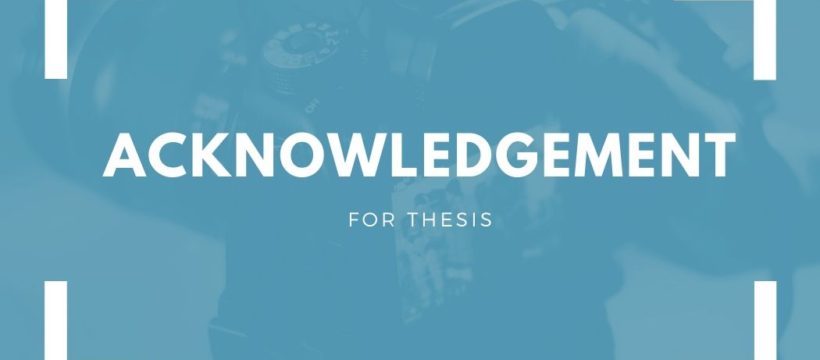
In the article below we provide you a sample of acknowledgement for bachelor or undergraduate thesis. We believe you may find it useful when writing your own acknowledgement page. Feel free to use this statement. We intentionally erased the names, so you can put ones that suits you.
ACKNOWLEDGEMENT
First and foremost, I have to thank my research supervisors, [Ms Name Surname] , [ Mr Name Surname ] and [ Ms Name Surname ]. Without their assistance and dedicated involvement in every step throughout the process, this paper would have never been accomplished. I would like to thank you very much for your support and understanding over these past four years.
I would also like to show gratitude to my committee, including [ Ms Name Surname ], [ Ms Name Surname ], [ Ms Name Surname ], [ Mr. Name Surname ] and [ Ms Name Surname ]. [ Ms Name Surname ]was my first-year [ subject ] professor at [ Name ]University. Her teaching style and enthusiasm for the topic made a strong impression on me and I have always carried positive memories of her classes with me. I discussed early versions of the [ Name of the subject ] with [ Mr. Name Surname ]. She raised many precious points in our discussion and I hope that I have managed to address several of them here. Eve though I have not had the opportunity to work with [ Mr. Name Surname ], [ Mr. Name Surname ], or [ Ms Name Surname ], previously, the impact of their work on my own study is obvious throughout this dissertation.
In March 2012, I went to [ Name ] University for several weeks to study with [ Ms Name Surname ]. My time at [ Name ] University has been highly productive and working with [ Ms Surname ] was an extraordinary experience. Much of the analysis presented in Section III is owed to my time at [ Name of the University ]. [ Mr Name Surname ] at the [ Name ] University kindly assisted me with the statistical analysis in this dissertation and was very patient with my knowledge gaps in the area. I must also thank two colleagues at the Department of [Name], [ Name Surname ] and [ Name Surname ], for giving me the retreat to have this thesis rushed to the printer.
Getting through my dissertation required more than academic support, and I have many, many people to thank for listening to and, at times, having to tolerate me over the past three years. I cannot begin to express my gratitude and appreciation for their friendship. [ Name Surname ], Name Surname ], [ Name Surname ] and [ Name Surname ] have been unwavering in their personal and professional support during the time I spent at the University. For many memorable evenings out and in, I must thank everyone above as well as [ Name Surname ], [ Name Surname ] and [ Name Surname ]. I would also like to thank [ Name Surname ] who opened both her home and heart to me when I first arrived in the city.
Most importantly, none of this could have happened without my family. My grandmother, who offered her encouragement through phone calls and letters every week – despite my own limited devotion to correspondence. With her own brand of humor, [ Name Surname ] has been kind and supportive to me over the last several years. To my parents and my sister– it would be an understatement to say that, as a family, we have experienced some ups and downs in the past three years. Every time I was ready to quit, you did not let me and I am forever grateful. This dissertation stands as a testament to your unconditional love and encouragement.
Featured Topics
Featured series.
A series of random questions answered by Harvard experts.
Explore the Gazette
Read the latest.
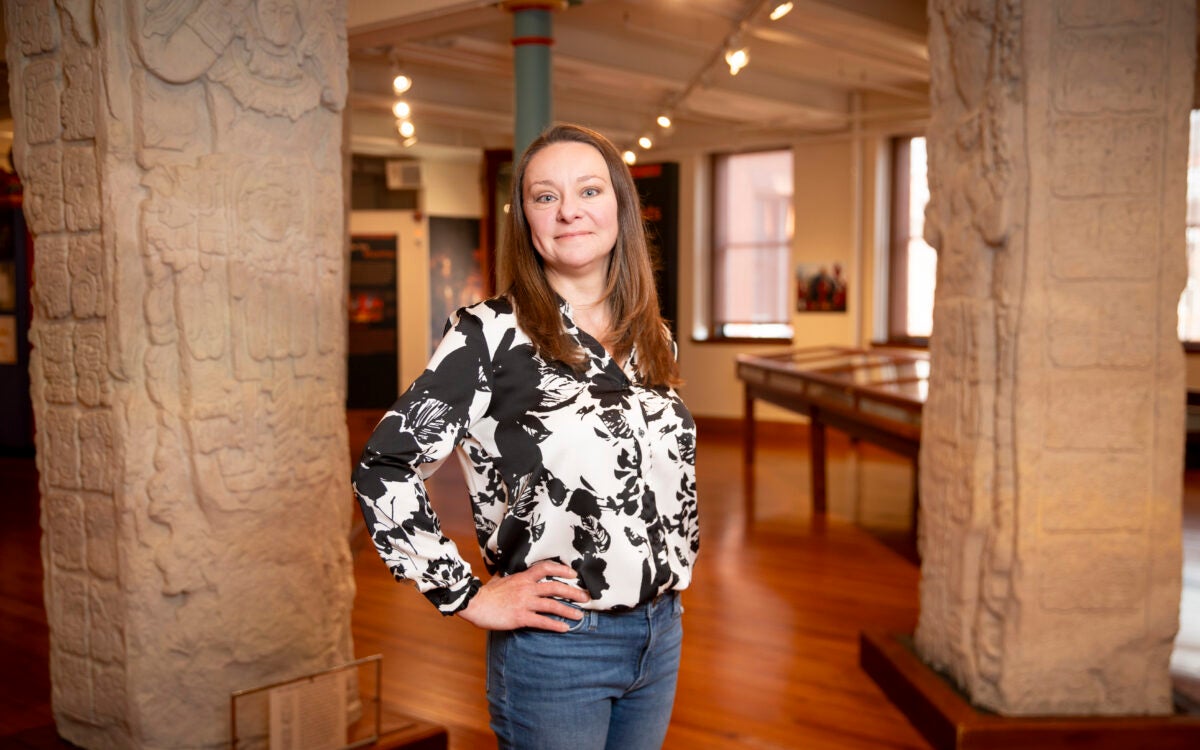
‘I haven’t really had a proper weekend in a long time’

Party like it’s 2020

Study of Psychedelics in Society and Culture announces funding recipients
So how do you track spread of disease by the numbers.
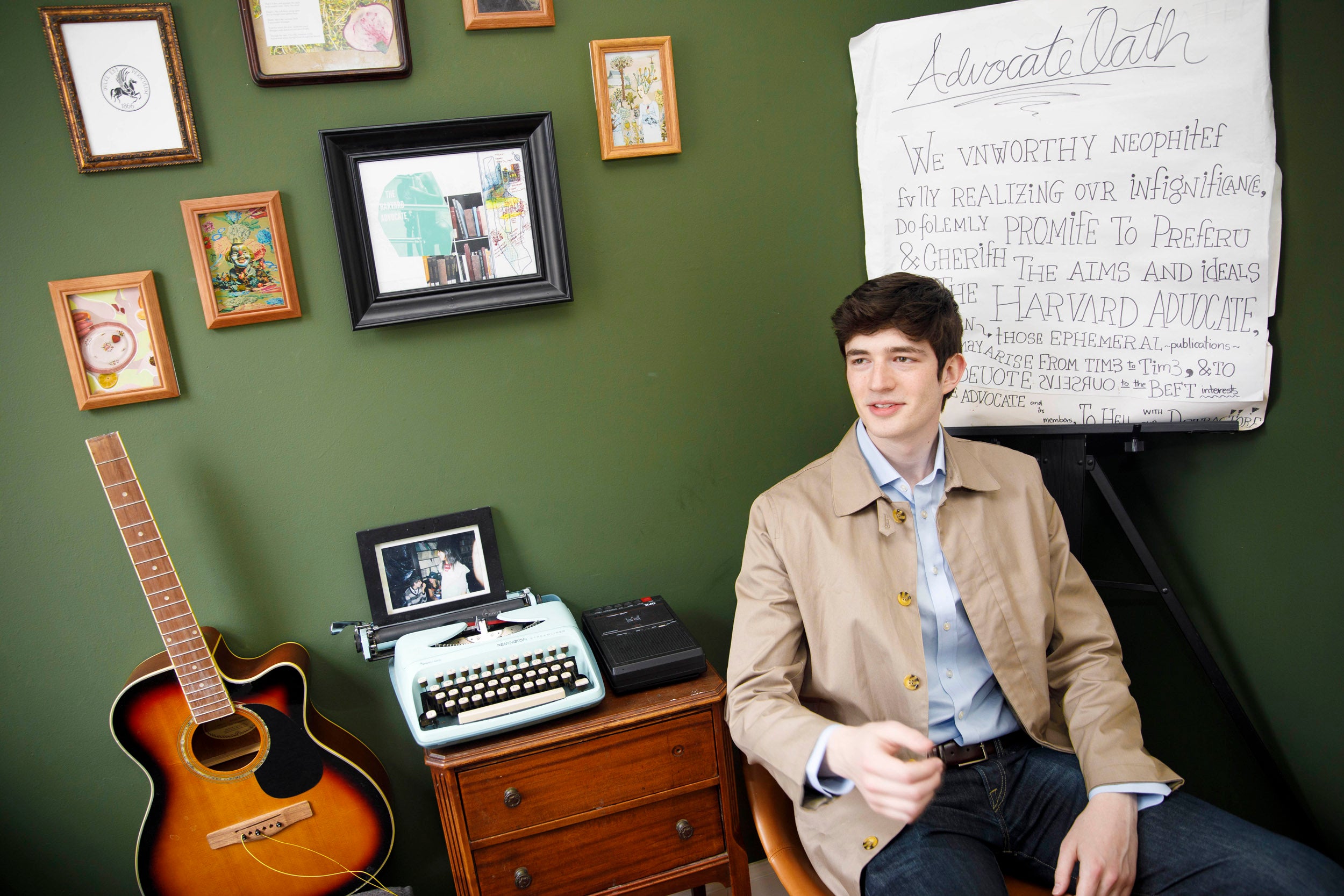
Kris Snibbe/Harvard Staff Photographer
Anne J. Manning
Harvard Staff Writer
Ivan Specht decided to employ his love of math during pandemic, which led to contact-tracing app, papers, future path
Part of the commencement 2024 series.
A collection of stories covering Harvard University’s 373rd Commencement.
Ivan Specht started at Harvard on track to study pure mathematics. But when COVID-19 sent everyone home, he began wishing the math he was doing had more relevance to what was happening in the world.
Specht, a New York City native, expanded his coursework, arming himself with statistical modeling classes, and began to “fiddle around” with simulating ways diseases spread through populations. He got hooked. During the pandemic, he became one of only two undergraduates to serve on Harvard’s testing and tracing committee, eventually developing a prototype contact-tracing app called CrimsonShield.
Specht took his curiosity for understanding disease propagation to the lab of computational geneticist Pardis Sabeti , professor in Organismic and Evolutionary Biology at Harvard and member of the Broad Institute, known for her work sequencing the Ebola virus in 2014 . Specht, now a senior, has since co-authored several studies around new statistical methods for analyzing the spread of infectious diseases, with plans to continue that work in graduate school.
“Ivan is absolutely brilliant and a joy to work with, and his research accomplishments already as an undergraduate are simply astounding,” Sabeti said. “He is operating at the level of a seasoned postdoc.”
His senior thesis, “Reconstructing Viral Epidemics: A Random Tree Approach,” described a statistical model aimed at tackling one of the most intractable problems that plague infectious disease researchers: determining who transmitted a given pathogen to whom during a viral outbreak. Specht was co-advised by computer science Professor Michael Mitzenmacher, who guided the statistical and computational sections of his thesis, particularly in deriving genomic frequencies within a host using probabilistic methods.
Specht said the pandemic made clear that testing technology could provide valuable information about who got sick, and even what genetic variant of a pathogen made them sick. But mapping paths of transmission was much more challenging because that process was completely invisible. Such information, however, could provide crucial new details into how and where transmission occurred and be used to test things such as vaccine efficacy or the effects of closing schools.
Specht’s work exploited the fact that viruses leave clues about their transmission path in their phylogenetic trees, or lines of evolutionary descent from a common ancestor. “It turns out that genome sequences of viruses provide key insight into that underlying network,” said the joint mathematics and statistics concentrator.
Uncovering this transmission network goes to the heart of how single-stranded RNA pathogens survive: Once they infect their host, they mutate, producing variants that are marked by slightly different genetic barcodes. Specht’s statistical model determines how the virus spreads by tracking the frequencies of different viral variants observed within a host.
As the centerpiece of his thesis, he reconstructed a dataset of about 45,000 SARS-CoV-2 genomes across Massachusetts, providing insights into how outbreaks unfolded across the state.
Specht will take his passion for epidemiological modeling to graduate school at Stanford University, with an eye toward helping both researchers and communities understand and respond to public health crises.
A graphic designer with experience in scientific data visualization, Specht is focused not only on understanding outbreaks, but also creating clear illustrations of them. For example, his thesis contains a creative visual representation of those 45,000 Massachusetts genomes, with colored dots representing cases, positioned nearby other “dots” they are likely to have infected.
Specht’s interest in graphics began in middle school when, as an enthusiast of trains and mass transit, he started designing imagined subway maps for cities that lack actual subways, like Austin, Texas . At Harvard, he designed an interactive “subway map” depicting a viral outbreak.
As a member of the Sabeti lab, Specht taught an infectious disease modeling course to master’s and Ph.D. students at University of Sierra Leone last summer. His outbreak analysis tool is also now being used in an ongoing study of Lassa fever in that region. And he co-authored two chapters of a textbook on outbreak science in collaboration with the Moore Foundation.
Over the past three years, Specht has been lead author of a paper in Scientific Reports and another in Cell Patterns , and co-author on two others, including a cover story in Cell . His first lead-author paper, “The case for altruism in institutional diagnostic testing,” showed that organizations like Harvard should allocate COVID-19 testing capacity to their surrounding communities, rather than monopolize it for themselves. That work was featured in The New York Times .
During his time at Harvard, Specht lived in Quincy House and was design editor of the Harvard Advocate, the University’s undergraduate literary magazine. In his free time he also composes music, and he still considers himself a mass transit enthusiast.
In the acknowledgements section of his thesis, he credited Sabeti with opening his eyes to the “many fascinating problems at the intersection of math, statistics, and computational biology.”
“I could fill this entire thesis with reasons I am grateful for Professor Sabeti, but I think they can be summarized by the sense of wonder and inspiration I feel every time I set foot in her lab.”
Share this article
Also in this series:.
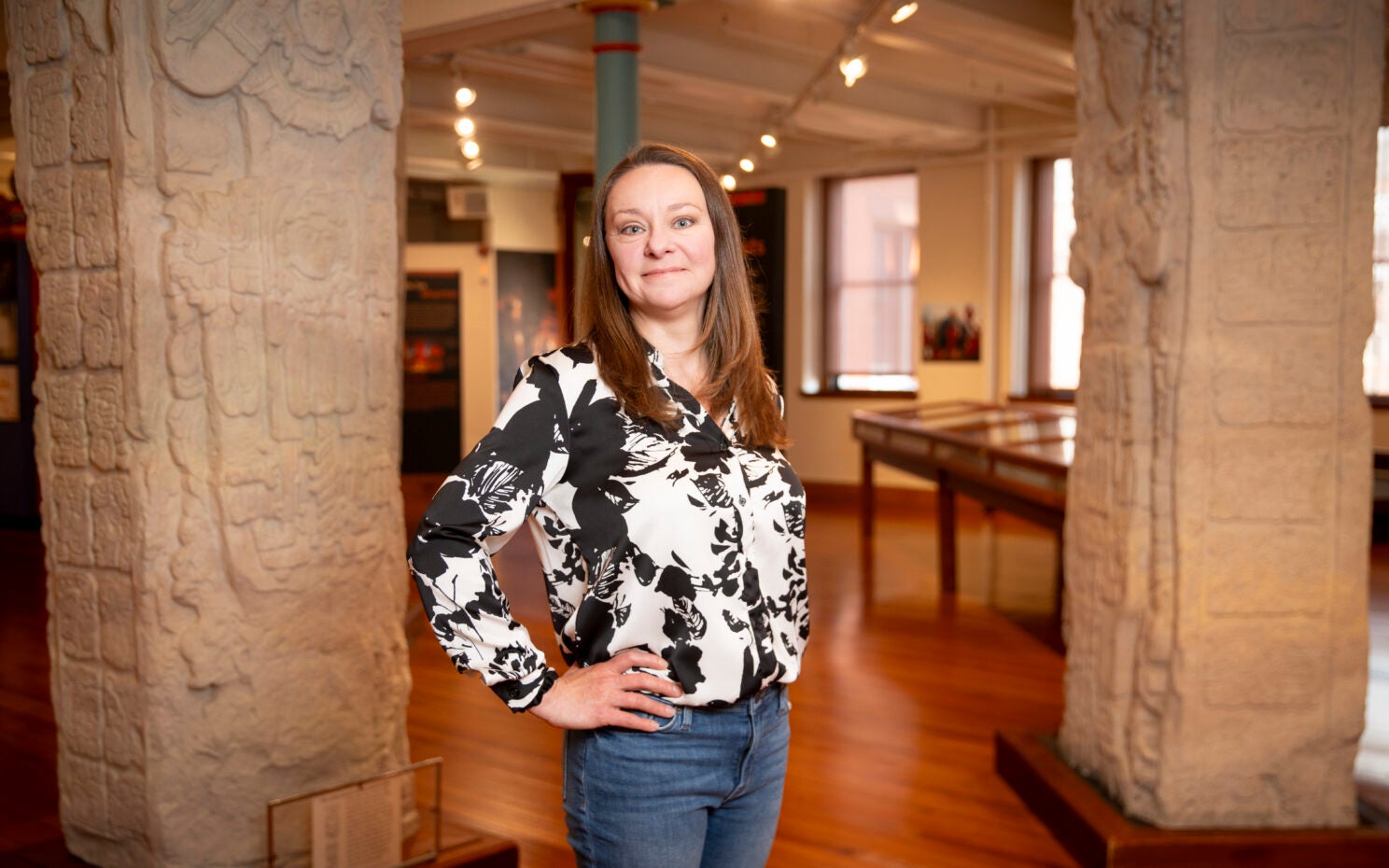
Longtime supporter of grads Kathy Hanley caps 13-year quest with a Commencement of her own

Class of ’24 gets a do-over on high school prom that pandemic took away
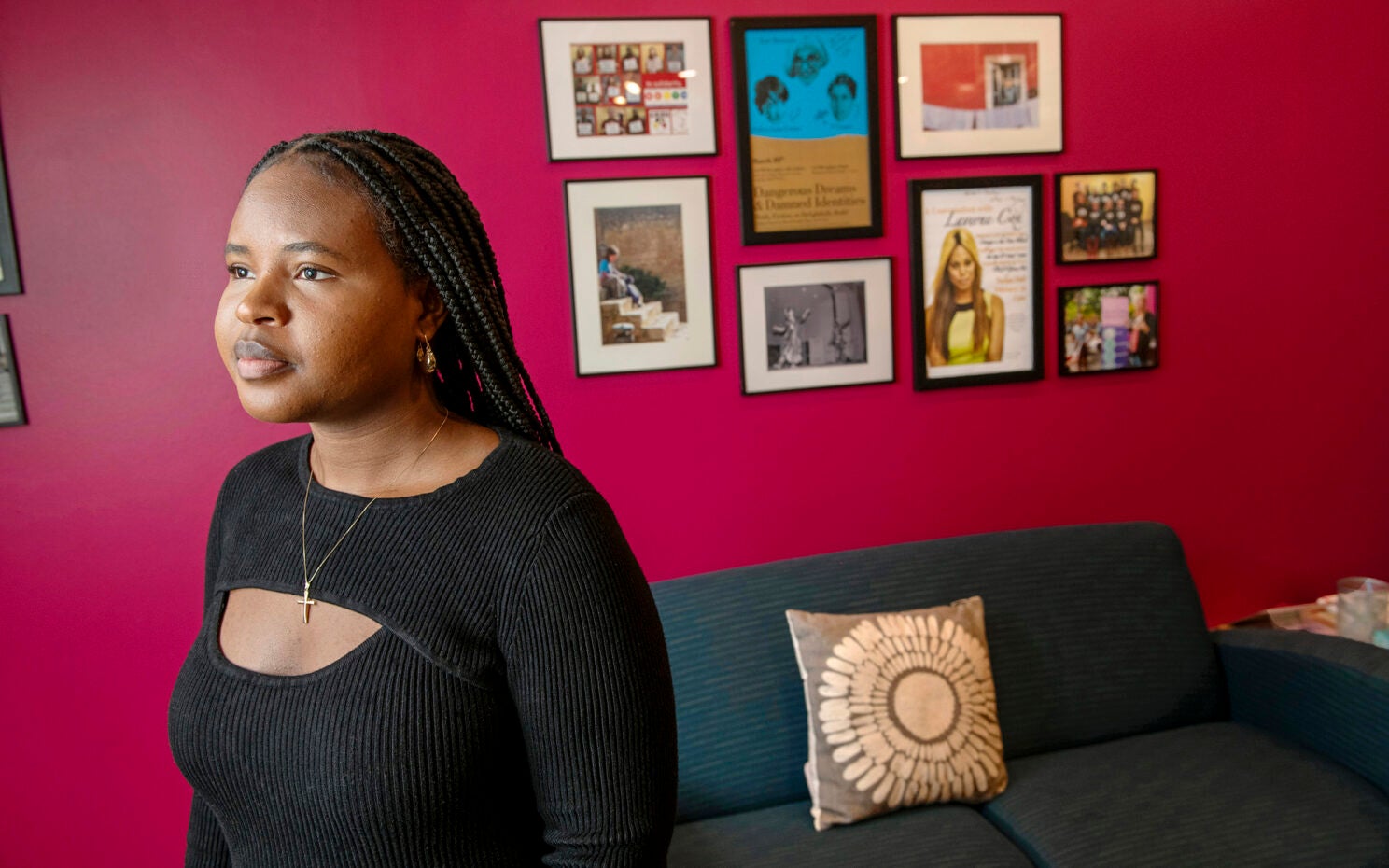
‘I was frustrated, infuriated, because women are just as capable’
Experiences in Uganda and U.S. fuel Ananda Birungi’s passion for empowering others, especially women and girls
You might like

Three major events, including Psychedelics Bootcamp 2024, to be hosted over summer
Epic science inside a cubic millimeter of brain
Researchers publish largest-ever dataset of neural connections
Pop star on one continent, college student on another
Model and musician Kazuma Mitchell managed to (mostly) avoid the spotlight while at Harvard
Finding right mix on campus speech policies
Legal, political scholars discuss balancing personal safety, constitutional rights, academic freedom amid roiling protests, cultural shifts
College of Engineering
Academic advising.
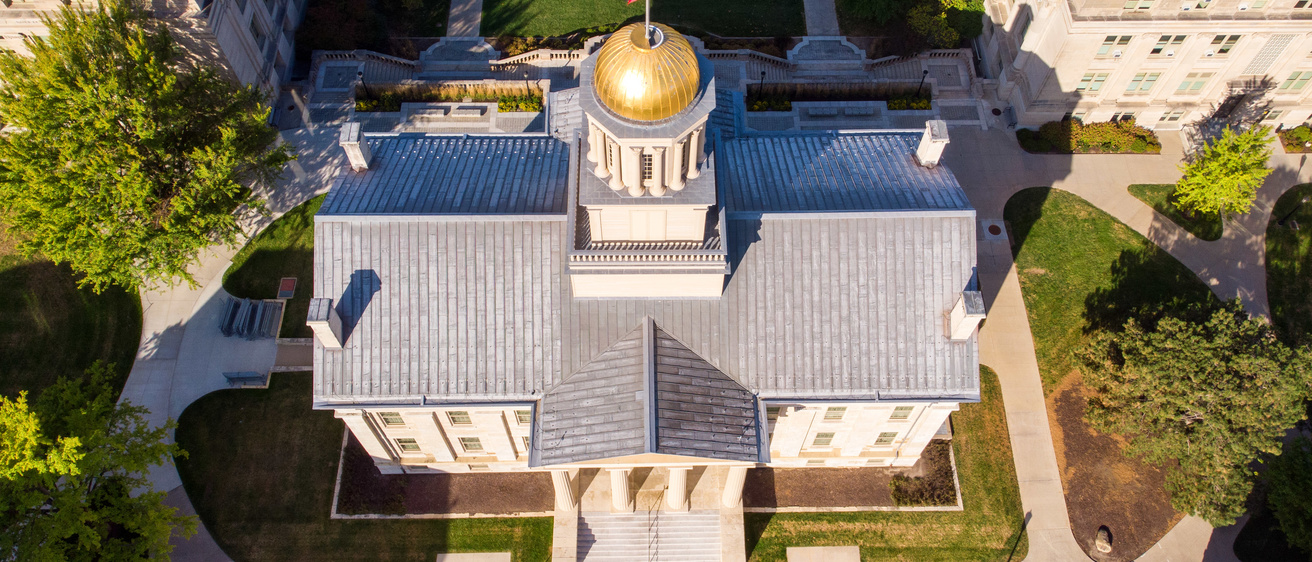
First Year and Undeclared
Advising for first year and undeclared engineering students takes place in the Student Development Center. Students are required to sign up for a time to meet with a professional advisor before early registration for the upcoming semester begins. Appointments can be made either through MyUI (Student Information - Advising Appointment), or by contacting the Student Development Center at [email protected] or 319-335-5763 or 3612 Seamans Center.
Undeclared engineering majors should declare their program of study no later than the start of the spring semester of their sophomore year.
Advising expectations for students
Faculty and Advising
Currently enrolled, declared engineering students are required to meet with their faculty academic advisor at least once a semester prior to registering for the next semester's courses, generally the week before early registration begins. Students will be able to schedule an appointment with their advisor through MyUI to meet and discuss their upcoming semester courses; alternatively, faculty will place a sign-up sheet outside their office door with available times. Typically, students can begin scheduling online or by sign-up sheet two weeks prior to early registration. If a student is unable to meet with their faculty during the times listed, it is the student's responsibility to contact the faculty member and set up a time that will fit within their schedule.
Students can find out who their academic advisor is by logging into MyUI and going to "Student Information" then "Program of Study and Advisors." Students wishing to change their academic advisor may do so by completing the Change of Academic Advisor form.
Advising expectations for students :
- To meet with their faculty advisor at least once a semester, although it is highly recommended to meet more frequently
- To arrive on time as scheduled
- To come prepared to the appointment with list of future courses, questions and concerns
- Students with questions regarding the pre-requisite check and policies should refer to the Pre-Requisite Q & A .
- See here for more advising expectations for students .
Peer Advising
The Peer Advisor program is a resource developed by students, for students. They offer advice on their respective majors, course combinations, course loads, and share their personal journeys to a career in engineering. Additionally, they provide support to their peers through workshops and outreach.
Come to the Student Development Center, 3612 Seamans Center, for assistance with your questions about majors, general education courses, or policies and procedures. The peer advisors work closely with the professional academic advising staff.
Meet our peer advisors
Pre-Professional Advising
Students who have declared a pre-professional major have the opportunity to meet with an additional advisor in the Academic Advising Center, C210 Pomerantz Center, throughout their undergraduate career. The pre-professional advisors will help students as they prepare for their application to graduate or professional school. These programs include pre-law, pre-medicine, pre-physical therapy, and other pre-health programs.
If you are interested in pursuing a pre-professional major in addition to your degree in engineering, email you advisor to declare.
Pre-Health Resources Pre-Law Resources
'Something More' Advising
In the College of Engineering, we hope that students will take advantage of numerous opportunities to get involved beyond the classroom to become an “Engineer and something more.” If you are interested in learning more about the opportunities below, you are welcome to schedule an appointment by contacting the Student Development Center at [email protected] , 319-335-5763 , or 3612 Seamans Center.
- Internships and co-ops
- Study abroad
- Student organizations
Advising Frequently Asked Questions
How do i add a course.
- You can add most courses on MyUI without any required approvals until Monday, January 22 at 11:59 pm . Search for the course on the “Course Type” search on MyUI ̶ Courses and Registration , located below the List View of your current courses. Once you identify an open section that works in your schedule, you can enroll instantly by clicking on the blue “ Enroll ” link on the right side.
- For assistance, review a step-by-step tutorial of the add process.
- If you do not receive the permissions by the next business day after your initiated request, call the department offering the course and your academic department or academic advisor.
- You will be able to access the course’s ICON site the following day.
- The last day to add most academic courses without Dean’s approval (which requires extenuating circumstances) is Monday, January 29 at 4:30 pm .
- See the Registrar's website for more information about adding courses .
HOW DO I CHANGE SECTIONS?
You can change sections on your own on MyUI without any required approvals until Monday, January 22 at 11:59 pm . Log into MyUI ̶ Courses and Registration . On the List View of your courses, scroll to the section you would like to change and click the “Change” link on right side. Select “Change Section” and choose your desired section from the list of available options. Click to confirm the change.
- Starting Tuesday, January 23 , you will need to request permissions from the instructor of the new section. You can initiate a section change through email following the process outlined on the Change of Registration Form webpage .
- See the Registrar's website for more information about changing sections.
HOW DO I ADD MYSELF TO A WAITLIST?
- First, check to see if there are open seats in any sections of the course you are interested in - seat availability changes frequently in the first two weeks of the semester. Search for the course on the “Course Type” search on MyUI ̶ Courses and Registration , located below the List View of your current courses. Once you identify an open section that works in your schedule, you can enroll instantly by clicking on the blue “ Enroll ” link on the right side.
- If all sections that work with your current course schedule are closed, select a section and click on the blue “ Join Waitlist ” link on the right side of the page. To increase your chances of enrolling, add yourself to any and all waitlists for sections that will work with your schedule.
- Continue to monitor email and text messages closely. If a waitlist seat is offered to you, you must follow the email/text instructions to fully add the course on MyUI. Waitlist seat offers expire after 24 hours.
- MyUI waitlists are only active until Monday, January 22 at 11:59 pm . Waitlists will no longer be used for filling seats that open up in a given course after that date. To add the course, you will need to initiate an add request and receive the instructor’s permission.
- See the Registrar's website for more information about waitlists .
HOW DO I DROP A COURSE?
- Most students can drop a class on MyUI without any permissions/authorizations until Monday, January 22 at 11:59 pm. Log into MyUI ̶ Courses and Registration . On the List view of your courses, scroll to the course you would like to drop and select the blue “Drop” link on right side of the page. Ensure that you click through all of the required screens to confirm the drop. International students and athletes may need to request additional permissions for a drop; specific instructions will be provided when initiating the drop process.
- Note that your academic advisor is not automatically notified of your request, so you should email them to request they authorize your drop. I t is your responsibility to obtain the required permissions in a timely manner, so if you do not have the requested authorization by the deadline, call your academic department to ensure that the drop is processed in time.
- Monday, April 15 by 4:30 pm is the last day to drop a class without a ‘W’ on your transcript. A ‘W’ on the transcript means you withdrew from a course. Please contact your academic advisor with any questions.
- The last day to drop most semester-length academic courses without Dean’s approval (which requires extenuating circumstances) is Monday, April 15 at 4:30 pm.
- If you are thinking of dropping all your courses, often referred to as ‘ withdrawing ’ from the University, contact your academic advisor or call the Student Development Center at 319-335-5763 to review the withdrawal process.
- See the Registrar's website for more information about dropping courses.
HOW DO I RESOLVE COURSE CONFLICTS?
- A red asterisk (*) on your schedule indicates that there is a conflict between course times. Take a close look at the class times and ensure that none of your lectures, labs, or discussions overlap. To resolve these conflicts, follow the instructions to change sections or stop by 3612 SC to speak with an academic advisor for assistance.
- If you cannot spot overlapping course times, the conflict may be a mid-term exam that is scheduled during the regular meeting time for another course. You should plan to attend your regularly scheduled course and email the professor giving the exam to set-up an alternative testing time. This is quite common, so do not stress, but make sure you make arrangements with your professor well in advance.
HOW DO I MEET WITH AN ACADEMIC ADVISOR?
- During the first two weeks of the semester, academic advisors in the Student Development Center, 3612 SC, offer drop-in hours from 10am-12pm and 1pm-3pm. These times are mostly for new, incoming students as they make adjustments to their first semester schedules at Iowa, but these can also be a good first stop if you are unsure who to contact.
- Beginning Monday, January 29 , and continuing through the entire semester, log into MyUI to see if your advisor offers online scheduling through the Advising Appointment tile. If you do not see appointments available, email your advisor directly to request an appointment. You can also contact your academic department with questions.
- Peer Advisors are available daily between 10:00 am – 12:00 pm and 12:30 – 3:00 pm in 3612 SC. If you prefer to meet with a Peer Advisor virtually, sign up for an appointment on their website . Visit the Peer Advisor website for more information including bios, schedule by major, and the option to schedule an individual appointment with a peer advisor.
HOW DO I ADD A MINOR, CERTIFICATE and/or PRE-MED DESIGNATION?
- You can add most minors and certificates on your own on MyUI ̶ Student Information ̶ Programs of Study & Advisor . You can then request a new degree audit to review the course requirements.
- Pre-health : Contact the Academic Advising Center directly by emailing [email protected] or calling (319) 353-5700 and request a pre-health advisor.
HOW DO I CHANGE MY MAJOR?
- WITHIN ENGINEERING : Complete the “Change of Major /Program of Study” form on the Academic Forms page . Your major will be changed and a new advisor assigned (if needed) within one week.
- OUTSIDE of ENGINEERING : Stop by the Student Development Center, 3612 SC, to meet with a professional advisor to review the process of changing colleges. If you are making the decision during the first week of the semester, stop by as soon as possible as it may be possible to make the change effective immediately.
WHAT DO I DO IF I AM SICK?
- The health of our community is important. Advisors in the Student Development Center are offering both virtual and in-person academic advising appointments. If you are feeling less than 100%, we encourage you to take advantage of virtual academic advising appointments or reschedule your in-person appointment for a later date.
- Specific guidance for what to do if you are sick, test positive for COVID-19, or may have been exposed, is available on the “What to do if you’re sick” UI Coronavirus website .
- If you feel sick and have symptoms consistent with COVID-19, stay home and isolate yourself as much as possible. If you develop symptoms while in class or on campus, go home or return to your dorm room. Call a health care professional who can assess your symptoms and risk factors and determine whether you need testing. Visit the Student Health website for information about how to request a test. If you need to speak to a nurse, contact Student Health by calling the Nurseline ( 319-335-9704 ). If you test positive, follow the instructions on the UI Coronavirus website . Self-report via the university's online system using this link and monitor your email for additional instructions.
- If you need to miss class, review the standard university absence from class policies and contact your instructor as soon as possible to discuss how to make up work.
ACADEMIC SUCCESS RESOURCES
- The College of Engineering offers a wide range of academic support resources for students. You are encouraged to visit Engineering Tutoring , Sunday – Thursday from 6:00 – 9:00 pm, in-person in 3612 SC. Tutoring will begin on Sunday, January 21 .
- Additional University of Iowa campus resources are listed here – we encourage you to try different resources to find the one(s) that will work best for you!
Quick Links
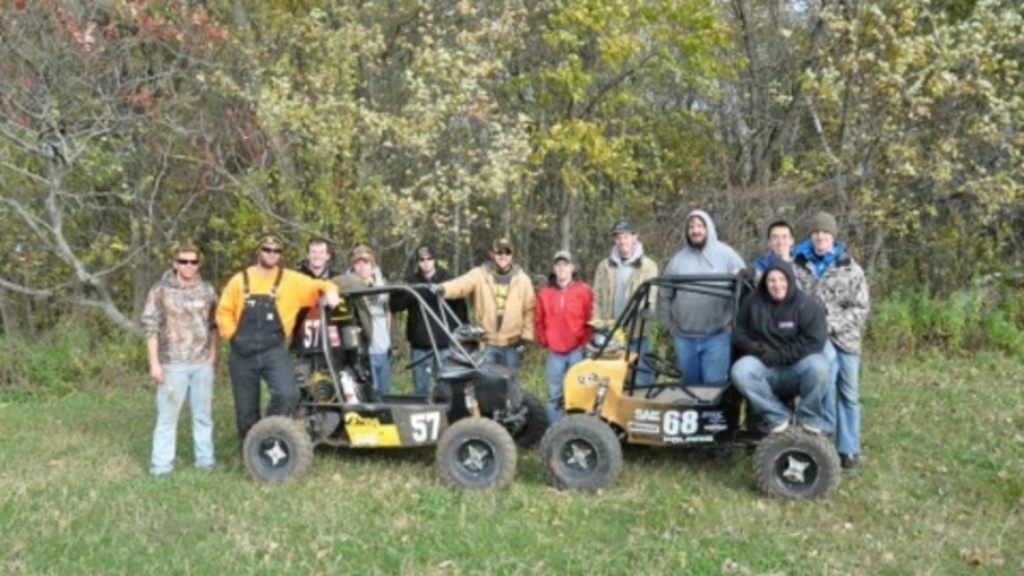
Office of the Registrar
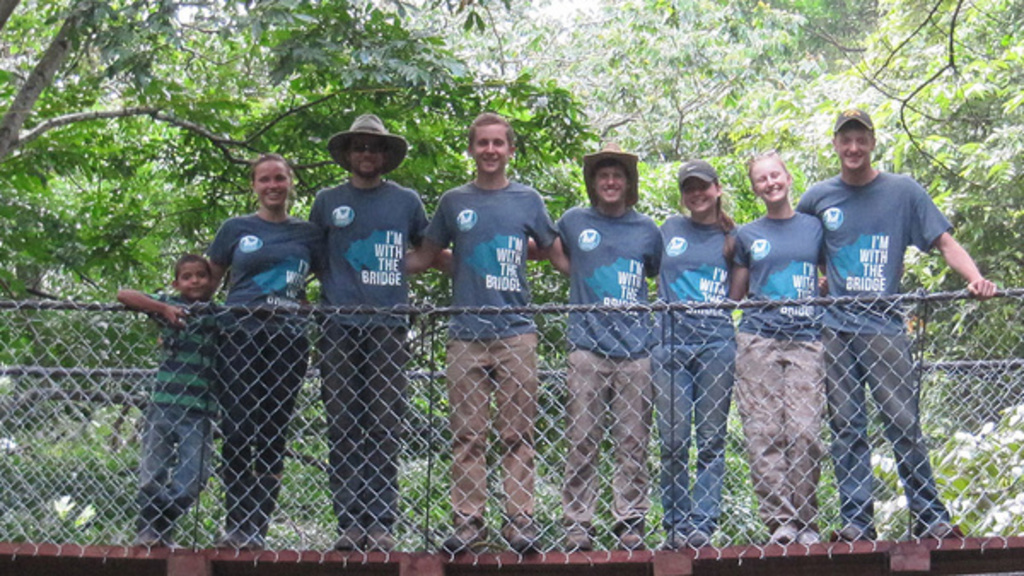
Taking Summer Courses
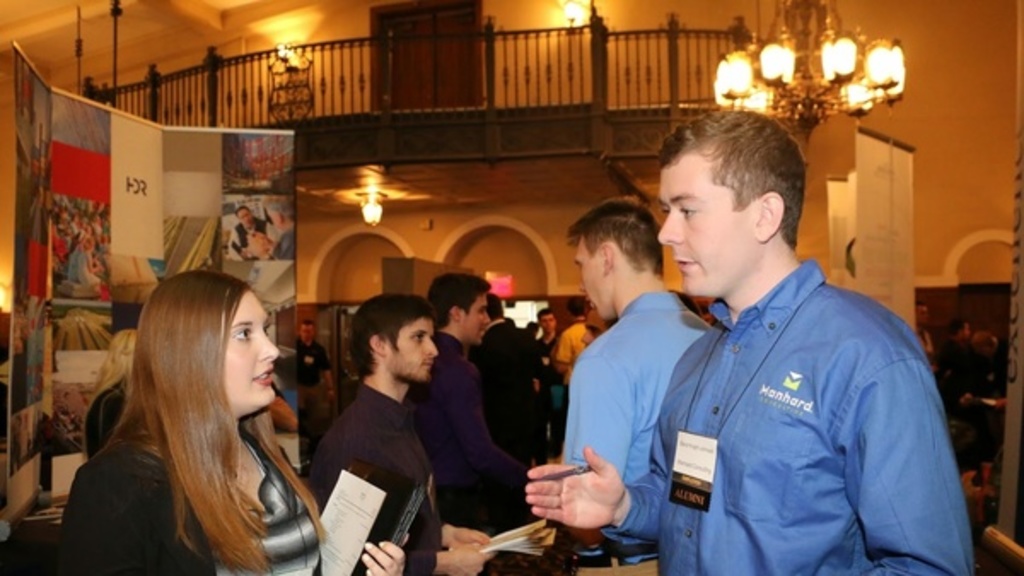
Academic Support and Tutoring
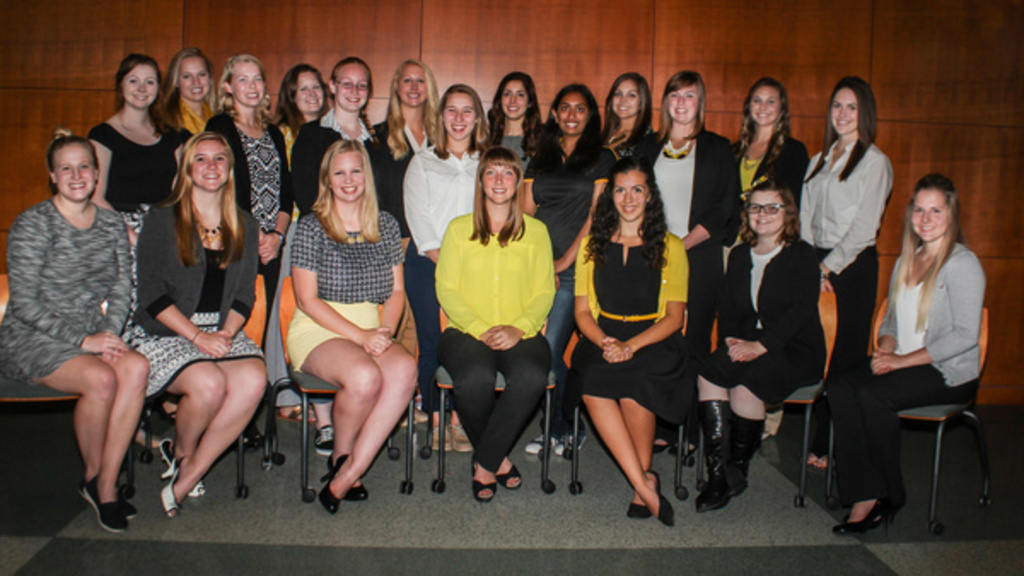
University Counseling Service

Filmscene | Common Ground
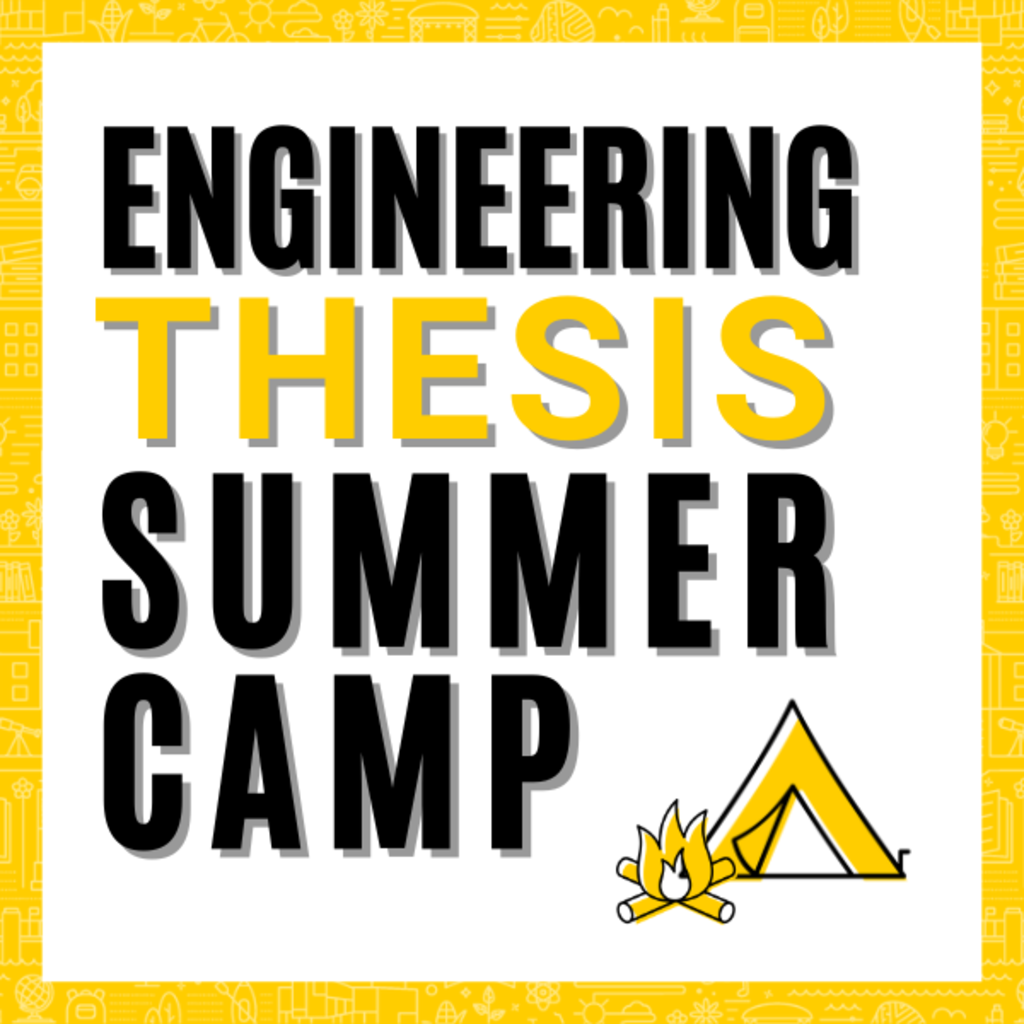
Writing Workshop (Narrative structure, Clarity, Cohesion) (Engineering Thesis Summer Camp)

Managing Anxiety/Stress/Procrastination (Engineering Thesis Summer Camp)
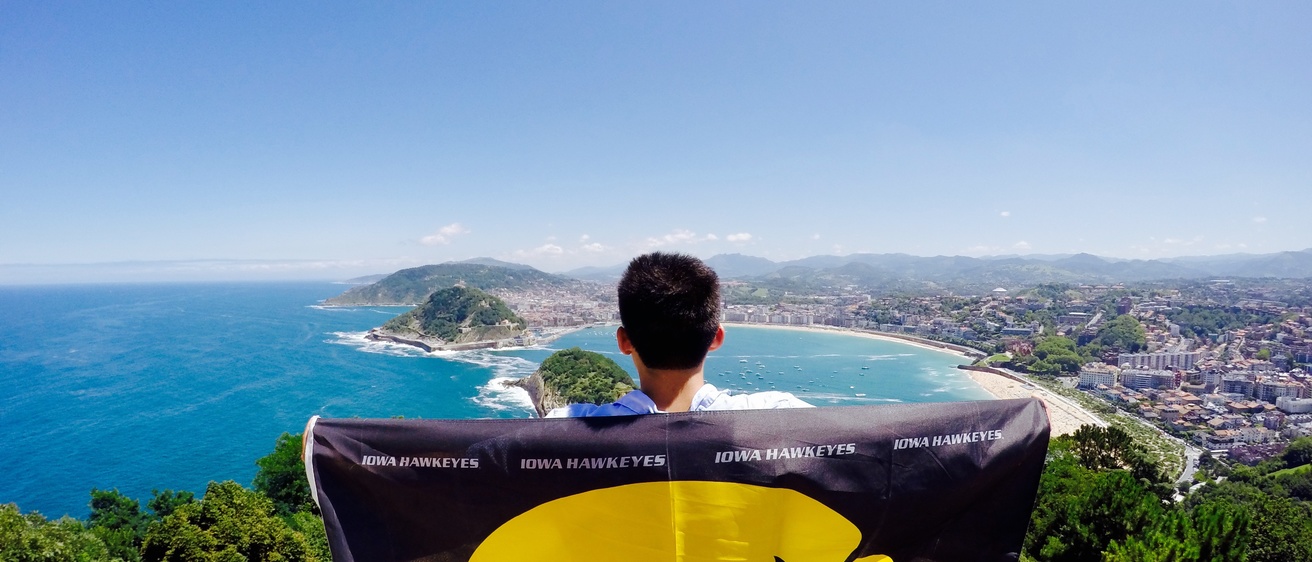
Questions? Talk to an Advisor
Have a language expert improve your writing
Run a free plagiarism check in 10 minutes, automatically generate references for free.
- Knowledge Base
- Dissertation
- Thesis & Dissertation Acknowledgements | Tips & Examples
Thesis & Dissertation Acknowledgements | Tips & Examples
Published on 4 May 2022 by Tegan George . Revised on 4 November 2022.
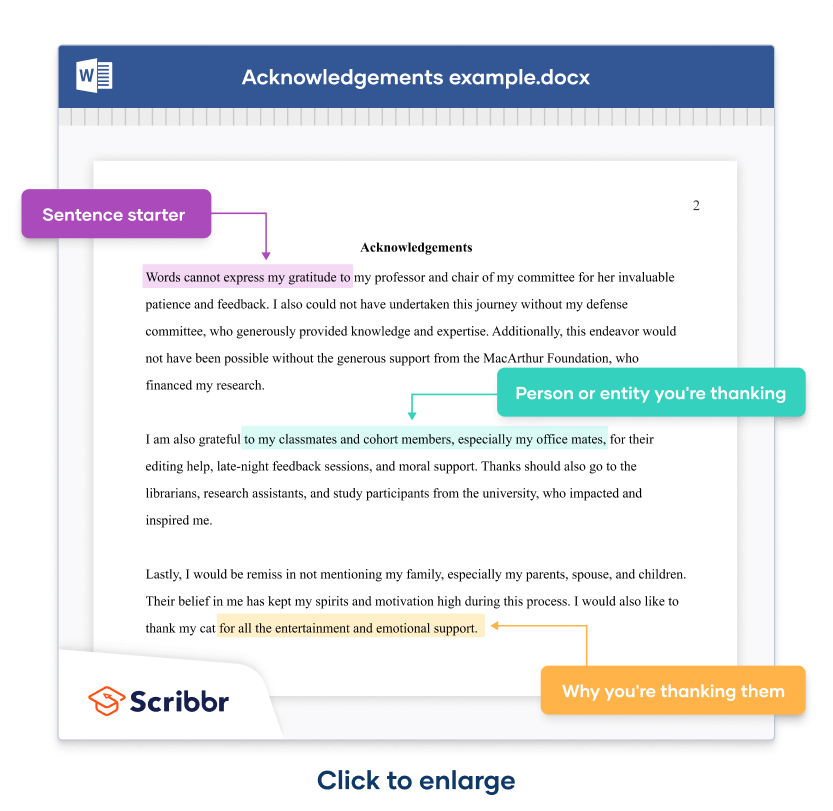
The acknowledgements section is your opportunity to thank those who have helped and supported you personally and professionally during your thesis or dissertation process.
Thesis or dissertation acknowledgements appear between your title page and abstract and should be no longer than one page.
In your acknowledgements, it’s okay to use a more informal style than is usually permitted in academic writing , as well as first-person pronouns . Acknowledgements are not considered part of the academic work itself, but rather your chance to write something more personal.
To get started, download our step-by-step template in the format of your choice below. We’ve also included sample sentence starters to help you construct your acknowledgments section from scratch.
Download Word doc Download Google doc
Instantly correct all language mistakes in your text
Be assured that you'll submit flawless writing. Upload your document to correct all your mistakes.

Table of contents
Who to thank in your acknowledgements, how to write acknowledgements, acknowledgements section example, acknowledgements dos and don’ts, frequently asked questions.
Generally, there are two main categories of acknowledgements: professional and personal .
A good first step is to check your university’s guidelines, as they may have rules or preferences about the order, phrasing, or layout of acknowledgements. Some institutions prefer that you keep your acknowledgements strictly professional.
Regardless, it’s usually a good idea to place professional acknowledgements first, followed by any personal ones. You can then proceed by ranking who you’d like to thank from most formal to least.
- Chairs, supervisors, or defence committees
- Funding bodies
- Other academics (e.g., colleagues or cohort members)
- Editors or proofreaders
- Librarians, research/laboratory assistants, or study participants
- Family, friends, or pets
Typically, it’s only necessary to mention people who directly supported you during your thesis or dissertation. However, if you feel that someone like a secondary school physics teacher was a great inspiration on the path to your current research, feel free to include them as well.
Professional acknowledgements
It is crucial to avoid overlooking anyone who helped you professionally as you completed your thesis or dissertation. As a rule of thumb, anyone who directly contributed to your research should be mentioned.
A few things to keep in mind include:
- Even if you feel your chair didn’t help you very much, you should still thank them first to avoid looking like you’re snubbing them.
- Be sure to follow academic conventions, using full names with titles where appropriate.
- If several members of a group or organisation assisted you, mention the collective name only.
- Remember the ethical considerations around anonymised data. If you wish to protect someone’s privacy, use only their first name or a generic identifier (such as ‘the interviewees’).
Personal acknowledgements
There is no need to mention every member of your family or friend group. However, if someone was particularly inspiring or supportive, you may wish to mention them specifically. Many people choose to thank parents, partners, children, friends, and even pets, but you can mention anyone who offered moral support or encouragement, or helped you in a tangible or intangible way.
Some students may wish to dedicate their dissertation to a deceased influential person in their personal life. In this case, it’s okay to mention them first, before any professional acknowledgements.
The only proofreading tool specialized in correcting academic writing
The academic proofreading tool has been trained on 1000s of academic texts and by native English editors. Making it the most accurate and reliable proofreading tool for students.

Correct my document today
After you’ve compiled a list of who you’d like to thank, you can then sort your list into rank order. Separate everyone you listed into ‘major thanks’, ‘big thanks’, and ‘minor thanks’ categories.
- ‘Major thanks’ are given to people who your project would be impossible without. These are often predominantly professional acknowledgements, such as your advisor , chair, and committee, as well as any funders.
- ‘Big thanks’ are an in-between, for those who helped you along the way or helped you grow intellectually, such as classmates, peers, or librarians.
- ‘Minor thanks’ can be a catch-all for everyone else, especially those who offered moral support or encouragement. This can include personal acknowledgements, such as parents, partners, children, friends, or even pets.
How to phrase your acknowledgements
To avoid acknowledgements that sound repetitive or dull, consider changing up your phrasing. Here are some examples of common sentence starters you can use for each category.
Note that you do not need to write any sort of conclusion or summary at the end. You can simply end the acknowledgements with your last thank-you.
Here’s an example of how you can combine the different sentences to write your acknowledgements.
A simple construction consists of a sentence starter (in purple highlight ), followed by the person or entity mentioned (in green highlight ), followed by what you’re thanking them for (in yellow highlight .)
Acknowledgements
Words cannot express my gratitude to my professor and chair of my committee for her invaluable patience and feedback. I also could not have undertaken this journey without my defense committee, who generously provided knowledge and expertise. Additionally, this endeavor would not have been possible without the generous support from the MacArthur Foundation, who financed my research .
I am also grateful to my classmates and cohort members, especially my office mates, for their editing help, late-night feedback sessions, and moral support. Thanks should also go to the librarians, research assistants, and study participants from the university, who impacted and inspired me.
Lastly, I would be remiss in not mentioning my family, especially my parents, spouse, and children. Their belief in me has kept my spirits and motivation high during this process. I would also like to thank my cat for all the entertainment and emotional support.
- Write in first-person, professional language
- Thank your professional contacts first
- Include full names, titles, and roles of professional acknowledgements
- Include personal or intangible supporters, like friends, family, or even pets
- Mention funding bodies and what they funded
- Appropriately anonymise or group research participants or non-individual acknowledgments
Don’t:
- Use informal language or slang
- Go over one page in length
- Mention people who had only a peripheral or minor impact on your work
You may acknowledge God in your thesis or dissertation acknowledgements , but be sure to follow academic convention by also thanking the relevant members of academia, as well as family, colleagues, and friends who helped you.
Yes, it’s important to thank your supervisor(s) in the acknowledgements section of your thesis or dissertation .
Even if you feel your supervisor did not contribute greatly to the final product, you still should acknowledge them, if only for a very brief thank you. If you do not include your supervisor, it may be seen as a snub.
In the acknowledgements of your thesis or dissertation, you should first thank those who helped you academically or professionally, such as your supervisor, funders, and other academics.
Then you can include personal thanks to friends, family members, or anyone else who supported you during the process.
The acknowledgements are generally included at the very beginning of your thesis or dissertation, directly after the title page and before the abstract .
In a thesis or dissertation, the acknowledgements should usually be no longer than one page. There is no minimum length.
Cite this Scribbr article
If you want to cite this source, you can copy and paste the citation or click the ‘Cite this Scribbr article’ button to automatically add the citation to our free Reference Generator.
George, T. (2022, November 04). Thesis & Dissertation Acknowledgements | Tips & Examples. Scribbr. Retrieved 14 May 2024, from https://www.scribbr.co.uk/thesis-dissertation/acknowledgements/
Is this article helpful?
Tegan George
Other students also liked, dissertation title page, how to write an abstract | steps & examples, dissertation table of contents in word | instructions & examples.

New Graduate Student Orientation 2024
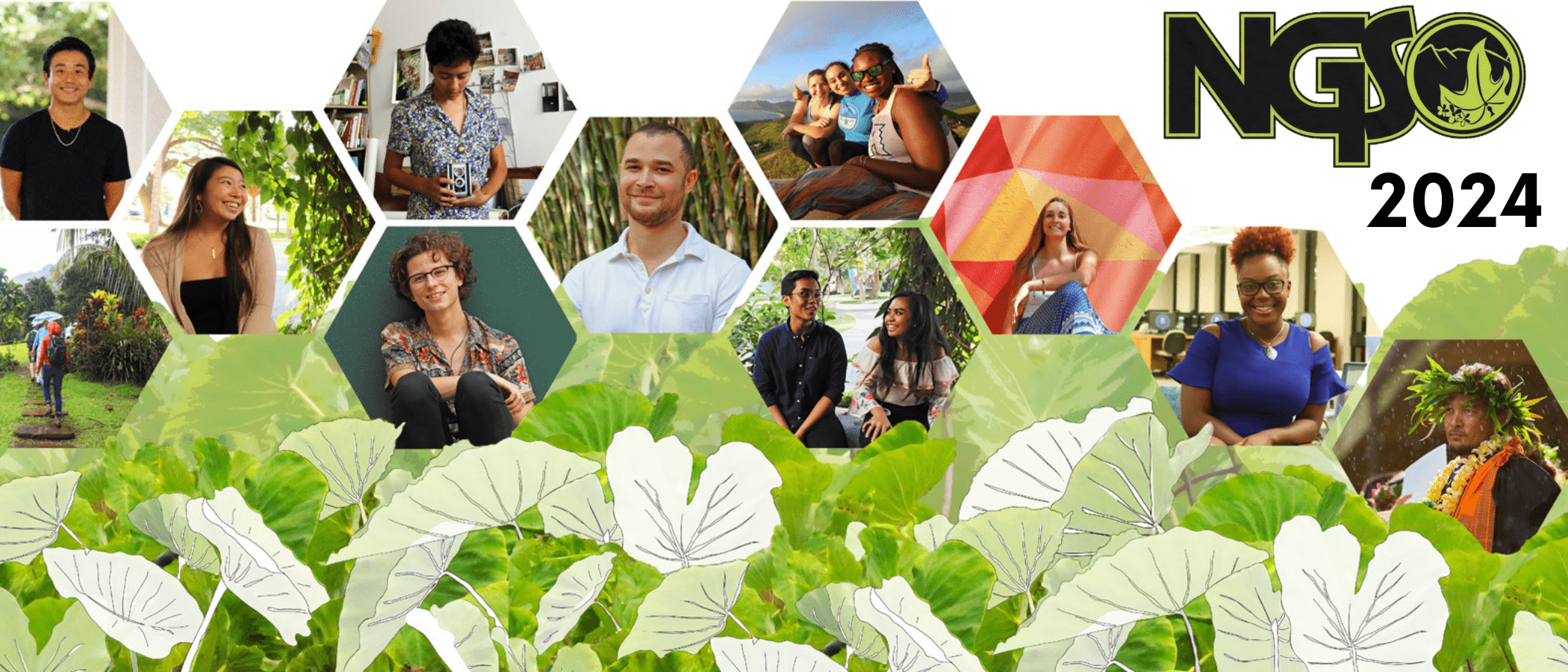
Congratulations on your acceptance to the University of Hawaiʻi at Mānoa (UH Mānoa)! Your journey to an advanced degree begins now! Graduate Division is excited to welcome you and invites you to attend New Graduate Student Orientation (NGSO). Participating in NGSO is a great opportunity to prepare for a successful graduate student experience. Session topics include learning about what to expect in grad school, developing good relationships with mentors, planning for funding opportunities, and much more.
Register Here
Event Schedule
Dates: August 5, 2024 to September 7, 2024
On-Demand Topic Sessions (August 5th)
NGSO topic sessions will be available on-demand starting August 5, 2024 . Participants have the flexibility to select which topics they would like to learn about at their convenience. Current topics include:
- What to Expect in Graduate School
- Finding Mentors & Building Effective Relationships
- Funding Your Graduate Studies
- UH Library: Basic Library Resources
Live Q & A with Topic Session Presenters (August 15th)
Spend 20 minutes per topic engaging with presenters in a facilitated Question & Answer session. Participants may attend in-person on campus or virtually during this synchronous event scheduled on August 15, 2024, 9:00 am – 12:00 pm (Hawaii Time) . Please check back for a detailed schedule of the day and location information.
Resource Fair & Activities (August 19th)
An in-person graduate student only resource fair and activities will be scheduled on campus for August 19, 2024, 9:00 – 11:30 am . Connect with key offices, programs, and services who support you during your graduate career. Also be sure to stop by the Campus Center to pick up your UH Student ID Card and make any last purchases at the UH Bookstore to prepare for school. Stay tuned for more details!
Community Work Day (September 7th)
Gather as a community on September 7, 2024, 8:00 am – 12:00 pm to engage and mālama ka ʻaina at Ka Papa Loʻi ʻO Kānewai on the Mānoa campus. Part of Hawaiʻinuiākea School of Hawaiian Knowledge at the University of Hawaiʻi at Mānoa, this site is a vital resource and home to the loʻi approximately 800 years old. Learn what to expect during this group visit . Registration will be limited.
Accessibility
Additional Graduate Student Events
Teaching Assistant Training
Dates: August 19-21, 2024
If you will be a new Teaching Assistant (TA), you are required to participate in the free Teaching Assistant Training (TAT). Sponsored by the Center for Teaching Excellence (CTE), Graduate Division, and the English Language Institute, this program includes sessions to help TAs prepare for their teaching responsibilities. For details and to register for TAT, please visit the CTE website .
International Student Welcome
Dates: August 19-23, 2024
Presented by the International Student Services (ISS) Office, the Welcome Week for new international students is the ISS version of orientation. Programming consists of information sessions and social opportunities, leading up to a “The Welcome Orientation and Reception.” All events are optional, but you are highly encouraged to participate and get the chance to gain important information and meet other international students and the ISS staff before school starts. For details and to register Welcome Reception, please visit the ISS website .
Admitted Student Steps to Enrollment
Visit our admitted students webpage to help you prepare for your enrollment at the University of Hawai‘i at Mānoa.
Campus Resources for Graduate Students
Start browsing through a list of Selected Campus Resources for Graduate Students to make connections before the semester begins.
Need to find a classroom, office, or water refill station? Our virtual campus map will help you navigate UH Manoa and provides a general campus map as well as specified resource maps.
All incoming UH Mānoa students may receive a UH ID card known as the Mānoa One Card. Cardholders are eligible for certain university privileges and benefits. For details on how to obtain your card in person, please visit the Mānoa One Card website . If you wish to submit your card request online, you may do so via the Mānoa One Card Upload site . Please note, however, that all UH ID cards must be picked up in-person at the Campus Center ID Office and will not be mailed. Summer ID Office hours are 10:00 a.m. to 3:00 p.m.
UH Bookstore
The UH Bookstore is the authorized on-campus retailer for books, UH spirit merchandise, school supplies, and commencement regalia. They also provide copying and printing services, office supplies, snacks, and sundries. Educational pricing is also available for Apple computers with proof of UH ID.
Graduate Division 2540 Maile Way Spalding Hall 3rd Floor Honolulu, HI 96822 Tel: (808) 956-8544 Email: [email protected] The University of Hawaiʻi is an Equal Opportunity/Affirmative Action Institution Use of this site implies consent with our Usage Policy | © 2020 Graduate Division | All Rights Reserved
- Graduate Programs
- Select a Program
- Admissions Standards
- Standardized Exams
- Documentation Requirements
- Deadlines & Notification
- Submitting Your Application
- Applying for Concurrent Degrees
- Dual Degrees
- Multiple Masters or Doctoral Degrees
- Graduate Certificates
- Master’s to PhD
- Readmission
- Applying as a PBU Student
- Change in Program
- UHM Faculty Admission
- Enrollment Regulations
- Admissions Requirements
- English Proficiency
- English Language Institute (ELI)
- International Student Services
- Overseas Advising & Useful Links
- Admitted Students
- Cost of Attendance
- Selected Campus Resources
- Registration
- Course Loads & Full-Time Definition
- Academic Progress
- Time Allowed for Completion of Degree
- Leave of Absence
- Degree Check
- Commencement
- Course Applicability
- Transfer & PBU Credits
- Credit by Examination
- Undergraduate Excess Credits
- Double-Counting Credits
- Required GDGPA
- Required Grades
- Grading Policies
- Disciplinary Actions
- Conduct Code
- Residency Program Requirement
- Language Requirement
- Exam Policies
- Master’s Plan A
- Master’s Plan B
- Master’s Plan C
- Graduate Certificate
- Change in Degree Requirements
- Requirements for Concurrent or Sequential Degrees
- Committee Composition & Potential Members
- Select Committee Member
- Format, Language & Content
- Authorship & Acknowledgement
- Style Policy
- Final Defense
- ProQuest ETD Submission & Publication
- Survey of Earned Doctorates (SED)
- Dissertation Written Under Funded Research
- Manuscript Copyright
- Remote Participation Resources
- Student Research Award
- Compliance & Ethical Standards
- Co-Authorship
- Intellectual Property
- Copyright & Patent
- Academic Advising
- Academic Policies
- Important Information
- Notice to New GAs
- Types & Duties
- Eligibility & Criteria
- Recruitment & Appointment
- Clarification of GA workload & compensation
- Compensation & Tax Withholding
- Sick and Bereavement Leave
- Rules & Regulations
- GA Grievance
- Frances Davis Award for Excellence in Undergraduate Teaching
- Record Keeping & Confidentiality
- Party Responsibilities
- Informal Resolution
- Formal Grievance
- Beyond Grad / Beyond Prof
- Achievement Scholarships
- College of Social Sciences Connector
- East West Center Fellowship and Housing
- Fellowships & Scholarships
- Fulbright Annual Competition Calendar
- Fulbright-Hays Dissertation Research Abroad
- Graduate Division STAR Fellowships & Scholarships
- UH Financial Aid Services
- UH Mānoa International Student Services Scholarships
- WICHE Program

'My research made me realize how fascinating psychology is'
5/17/2024 A&S Communications
Feifei (Lily) Ren
Psychology Beijing, China
What was your favorite class and why?
My favorite class was environmental psychology with Professor Gary Evans because that class was inspirational to me on a personal level. It provided me answers that I was not able to understand by myself.
What are the most valuable skills you gained from your Arts & Sciences education?
My education here at A&S taught me professional communication skills and research skills that I will definitely be able to implement in my future careers.
What have you accomplished as a Cornell student that you are most proud of?
I am very proud of my academic accomplishments. I was able to improve myself academically every semester, and I was part of many research projects and labs, including my honors thesis project. My research experience, especially my honors thesis project, made me realize how fascinating psychological research is, and inspired me to do more.
If you were to offer advice to an incoming first year student, what would you say?
Try to be patient with your personal life and academic life! Try to take things easy and prioritize your personal wellbeing.
Every year, our faculty nominate graduating Arts & Sciences students to be featured as part of our Extraordinary Journeys series. Read more about the Class of 202 4.
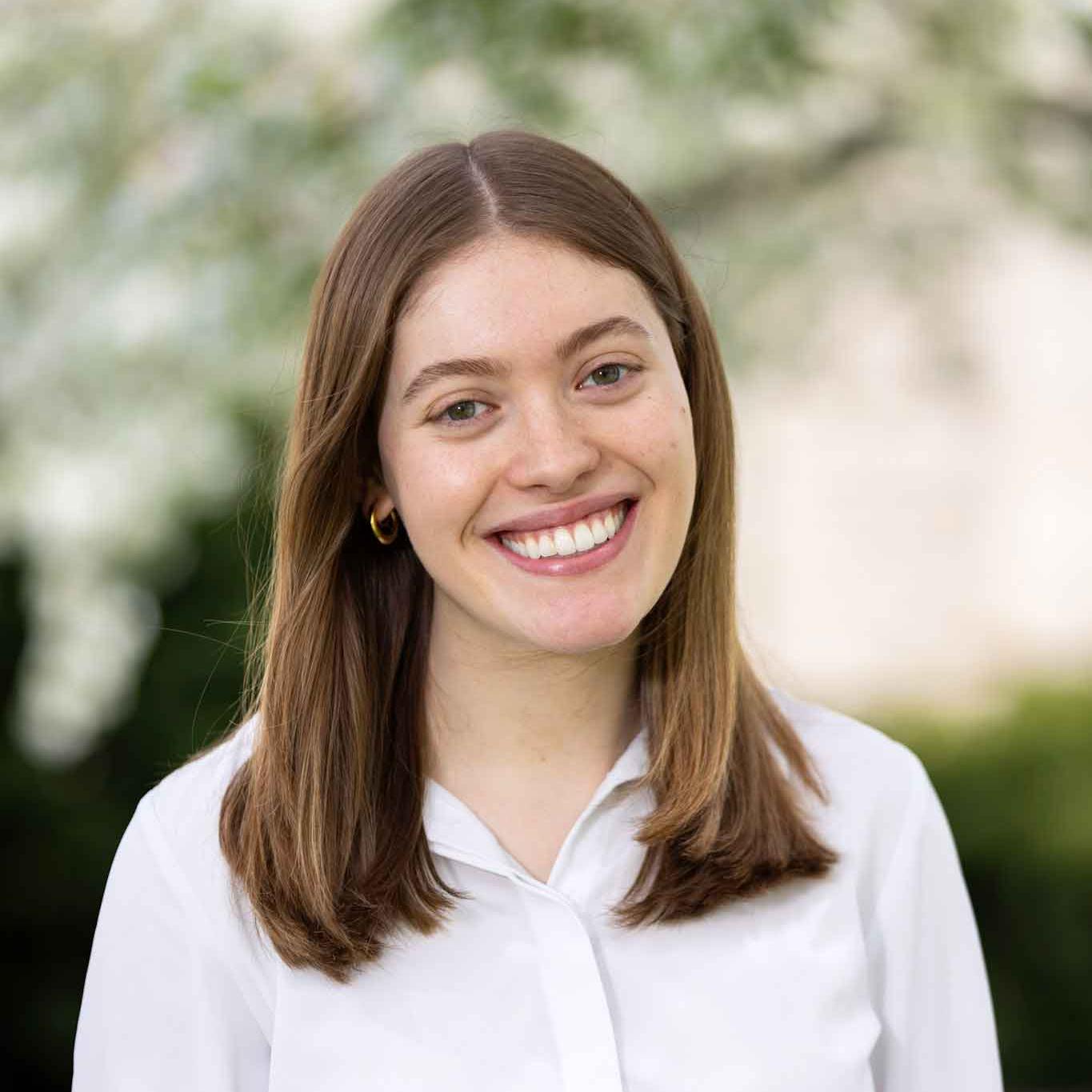
'It was rewarding to build something that people from the community enjoyed and learned from'
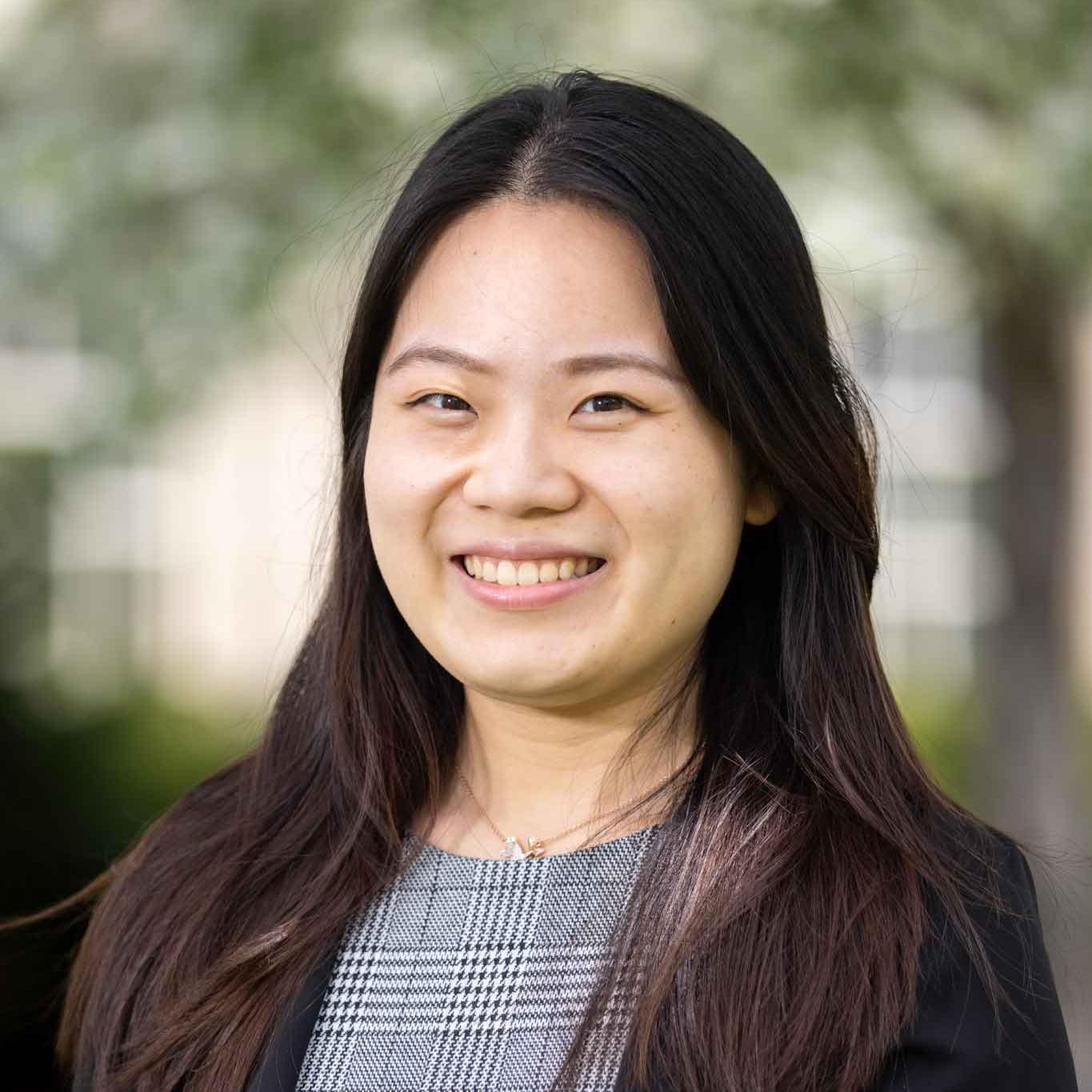
'I dream of investigating virtual reality and making an impact on the world'
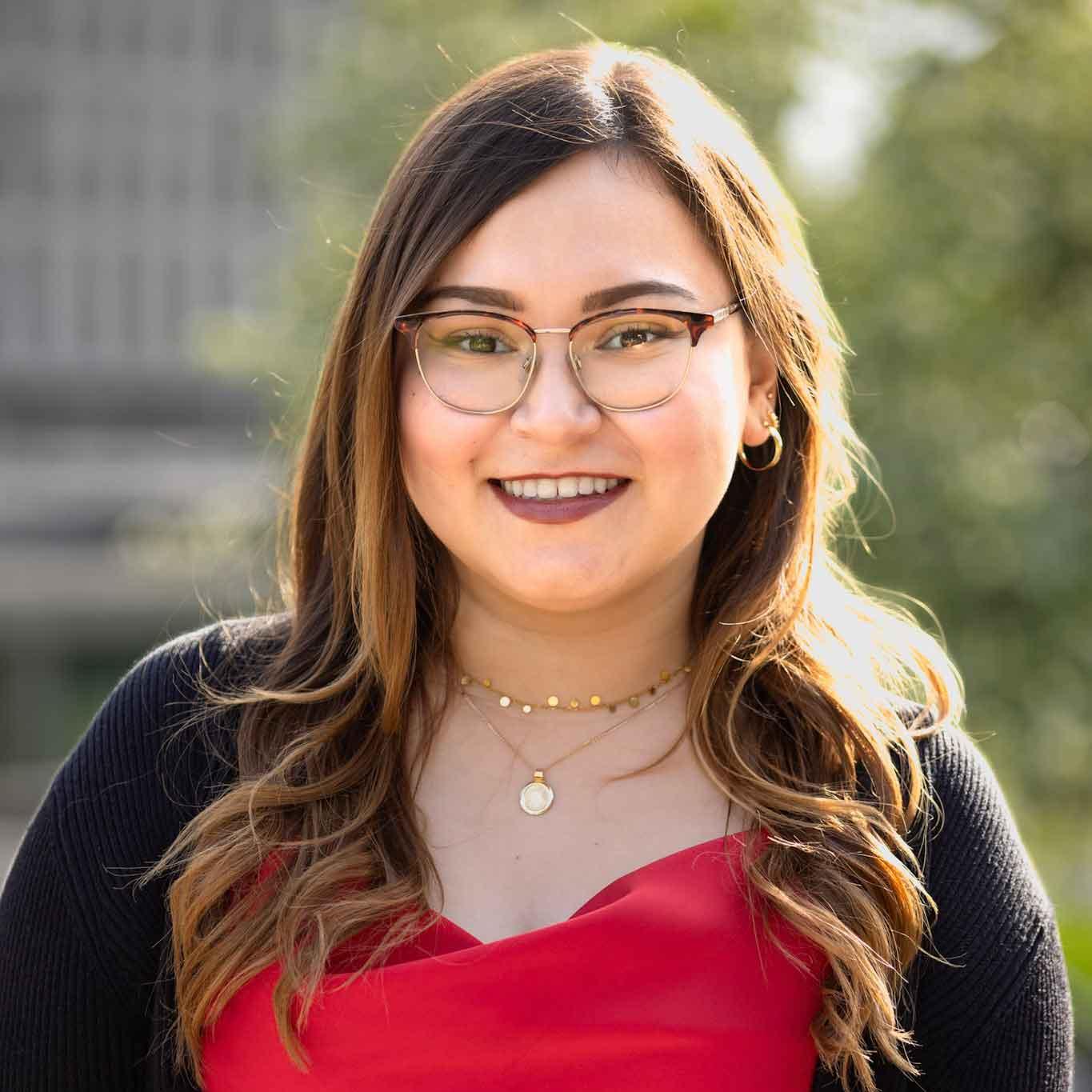
'I'm a researcher in Cornell's Play and Learning Lab'
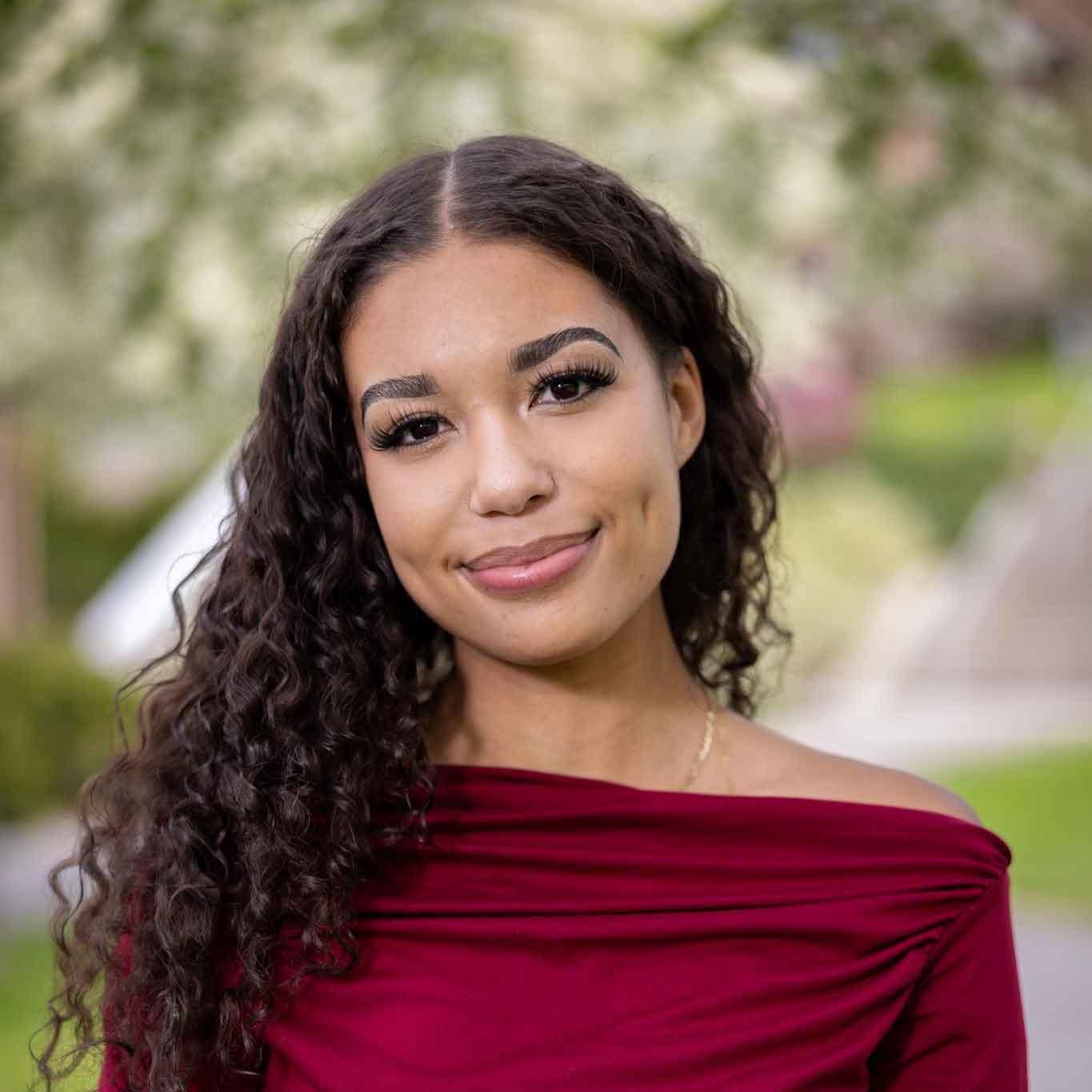
'I felt more empowered as a student and a woman'

- University of California, Irvine

We use cookies on this site to enhance your experience and tailor content. By continuing to use our sites, you accept our use of cookies. For further information please see UCI Privacy and Legal Notice .
Legacies of Pre-migration Marginalization - Dissertation Fieldwork and Themes
- May 21, 2024
- 12:30p.m. - 1:30p.m.
- Social Science Tower, Room 777
- Mary Isaac, Department of Political Science, UCI
How do pre-migration political experiences impact refugees’ political behavior and interest in integration within host states? Through in-depth interviews with Iraqi refugees of varying ethno-religious backgrounds and relationships to Saddam Hussein's regime, Isaac found that groups who faced marginalization in Iraq were less interested in integration broadly in comparison to non-marginalized groups. Both groups were similarly mobilized by religious and civic institutions, on par with the literature on immigrant political participation. This presentation focuses on the research methods Isaac used to conduct fieldwork and to organize my dissertation.
- Contact: Lina Lopez, [email protected]
- Sponsor: Center for Global Peace and Conflict Studies
School Calendar
Connect with us.
© UC Irvine School of Social Sciences - 3151 Social Sciences Plaza, Irvine, CA 92697-5100 - 949.824.2766
Office of Undergraduate Education
University Honors Program
- Honors Requirements
- Major and Thesis Requirements
- Courses & Experiences
- Nova Series
- Honors Courses
- NEXUS Experiences
- Non-Course Experiences
- Faculty-Directed Research and Creative Projects
- Community Engagement and Volunteering
- Internships
- Learning Abroad
- Honors Thesis Guide
- Sample Timeline
- Important Dates and Deadlines
- Requirements and Evaluation Criteria
- Supervision and Approval
- Credit and Honors Experiences
- Style and Formatting
- Submit Your Thesis
- Submit to the Digital Conservancy
- Honors Advising
- Honors Reporting Center
- Get Involved
- University Honors Student Association
- UHSA Executive Board
- Honors Multicultural Network
- Honors Mentor Program
- Honors Community & Housing
- Freshman Invitation
- Post-Freshman Admission
- Frequently Asked Questions
- Faculty Fellows
- Faculty Resources
- Honors Faculty Representatives
- Internal Honors Scholarships
- Office for National and International Scholarships
- Letters of Recommendation
- Personal Statements
- Scholarship Information
- Honors Lecture Series
- Honors Recognition Ceremony
- Make a Donation
- UHP Land Acknowledgment
- UHP Policies
Honors alumni Brandon Kasprick, policy advisor to Gov. Walz
Growing up on a family farm in northwest Minnesota influenced Brandon Kasprick’s entire life path. His time on the farm inspired his passion for public service, and his family instilled that from a young age.
“Work wasn’t about the financial motivation, it was about becoming something larger than yourself and finding a passion that brings you through day by day,” he said. “You have to love your work.”
Brandon’s dad is a farmer and his mother is a teacher. They both saw their work as a calling, whether it was feeding the world or supporting the next generation. Even the most mundane or frustrating tasks - like picking rocks out of a field - were in service of that greater calling. Brandon knew he would find his own calling and the first step was pursuing higher education.
In 2017, Brandon began attending the University of Minnesota as an Honors student majoring in political science and biology. During his first year of school, he took an Honors course on international relations that would end up influencing his entire time in school. He loved the small class size, especially as a first year student.
“We were able to dive more into the issues and have more robust conversations - not just with the other students but also with the professor,” he said.
He ended up staying in contact with that professor, John Freeman, throughout his undergraduate career. When the time came to write his thesis, he asked Dr. Freeman to be one of his advisors. Brandon’s thesis focused on how rural Minnesota residents responded to the trade war. It was a way to combine all of his interests: science, policy, and public service.
In addition to completing his Honors thesis, taking seminars, and participating in non-course experiences, Brandon took every extracurricular opportunity he could. From interning with Senator Amy Klobuchar’s reelection campaign to working as a student research assistant, each role got him closer to where he is now.
“There are a lot of opportunities at the U, but there’s still a path for you to carve your own way,” he said.
After college, Brandon moved to Washington D.C. to work for as a researcher for the U.S. Senate Committee on Armed Services, using his scientific background in the political field. He spent nearly three years in that role before another opportunity opened up - this time in Minnesota. He now works as a policy advisor for Governor Tim Walz.
“For a farm kid from northwestern Minnesota, there’s no greater honor than to serve the governor on agricultural issues,” he said.
- Summer Research Opportunities
- Global Seminars and LAC Seminars
- Honors Research in London - Summer 2024
Interdisciplinary Graduate Program in Neuroscience
Congratulations to jax skye on a successful thesis defense.
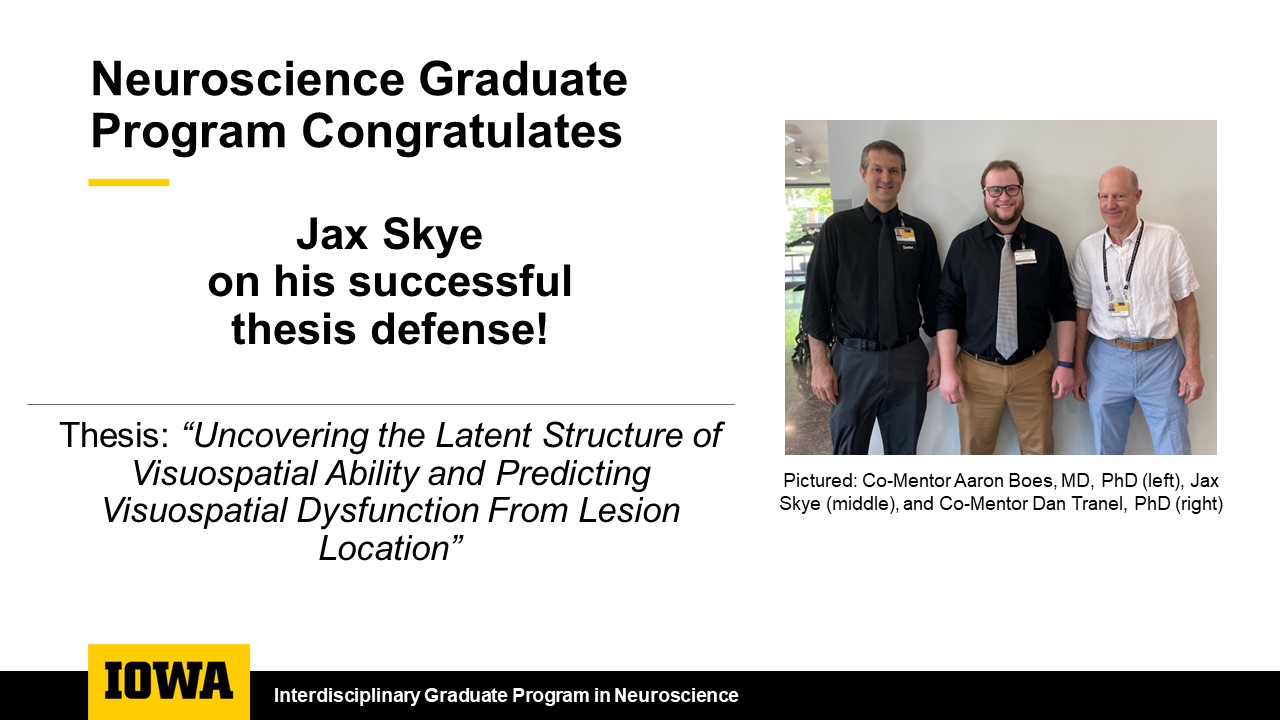

IMAGES
VIDEO
COMMENTS
As you can see in this example, the section is short and to the point, working from formal support through to personal support. If you're interested, you can explore a few more examples here. To simplify the process, we've created a free template for the acknowledgements section. If you're interested, you can download a copy here.
The acknowledgements section is your opportunity to thank those who have helped and supported you personally and professionally during your thesis or dissertation process. Thesis or dissertation acknowledgements appear between your title page and abstract and should be no longer than one page. In your acknowledgements, it's okay to use a more ...
Undergraduate Thesis Acknowledgment Section. The acknowledgment section of this undergraduate thesis is a heartfelt tribute to those who made this academic endeavor possible. I am profoundly grateful to my thesis advisor, Dr. Rodriguez, for her invaluable guidance and encouragement. I also wish to acknowledge the support of my classmates, whose ...
1 Tips on Writing Acknowledgement for Thesis. 2 Best Acknowledgement for Thesis Samples. 2.1 Acknowledgement Sample for Thesis. 2.2 Acknowledgement for Thesis Submission. 2.3 Acknowledgement for Thesis Report. 2.4 Beautiful Thesis Acknowledgement. 2.5 Acknowledging God in Thesis. 2.6 Funny Thesis Acknowledgement.
My labmate's thesis, who wrote the acknowledgements in a different style to the rest by using bullet points. Dr Wei's thesis, acknowledgements on page 6. Direct download here. Shortest acknowledgements section of the list at 122 words. Dr Manca's thesis, acknowledgements on page 5. Direct download here.
10. "The completion of this thesis or dissertation is the culmination of efforts from various individuals whom I would like to express my sincere appreciation.". 11. "This thesis acknowledgement section is an opportunity to give thanks to those who made this journey less daunting.". 12.
The thesis acknowledgement is typically placed at the beginning of the thesis, after the title page and before the table of contents. Leaving empty pages, such as page 2 and often page 4, helps in maintaining a visually pleasing layout, when double-sided printing is used. Where to position the acknowledgement when double-sided printing is used.
Example 2. I would like to thank my supervisors Dr. XXX and Dr. XXX for all their help and advice with this PhD. I would also like to thank my sisters, whom without this would have not been possible. I also appreciate all the support I received from the rest of my family. Lastly, I would like to thank the XXX for the studentship that allowed me ...
Here are some good examples to help you get started: Example 1. I couldn't have reached this goal without the help of many people in my life. I'd like to take this opportunity to thank them for their support. First, my sincere thanks to my dissertation committee. The value of their guidance cannot be overstated. Dr.
help you write your Acknowledgements section of your dissertation. According to one source, the Acknowledgements section of a Ph.D. dissertation is the most widely read section. Whether you believe this or not, many individuals who helped you in the process of writing may check to see if, indeed, they have meant something to you.
"Explore a comprehensive acknowledgement sample for undergraduate thesis, providing insights into expressing gratitude and recognition for support received during the academic journey." When it comes to writing acknowledgements for your bachelor's thesis, it's important to express gratitude to those who have supported you throughout ...
This acknowledgment is a reflection of the collaborative effort that went into the successful completion of this master's dissertation. Undergraduate Dissertation Acknowledgements. Completing my undergraduate dissertation was a journey marked by invaluable support from various corners. I express my deep gratitude to my advisor for their ...
Normally, there's someone - or many people - that you want to thank. Some famous dissertation acknowledgement examples even focus on someone's dog or cat. Remember, this is your dissertation, you can really thank whoever you want. Just a small warning before you begin writing, be sure to double-check your institution's guidance.
Here are 14 dissertation acknowledgements examples to inspire you. They cover a range of academic subjects and are all from UK students. Note how they vary in length, style and substance. ... Furthermore I would like to thank the rest of the undergraduate research team for their collaborative effort during data collection. I would also like to ...
The acknowledgement section differs from the rest of your PhD thesis, as it does not relate directly to the research, is addressing your readers, and thus can be less formal. Keep your language simple. Avoid complex and long phrases. Keep everything simple and straightforward. Your writing can be more informal.
Thesis Acknowledgement Samples - Sample 17. My first and big appreciation goes to my first supervisor, Prof Habin Lee, for his marvelous supervision, guidance and encouragement. Sincere gratitude is extended to his generous participation in guiding, constructive feedback, kind support, and advice during my PhD.
Acknowledgements I would like to thank all the people who contributed in some way to the work described in this thesis. First and foremost, I thank my academic advisor, Professor Julia A. Kornfleld, for accepting me into her group. During my tenure, she contributed to a rewarding graduate school experience
Inclusion of an acknowledgements page or dedication page (or both) is optional. If included, these pages are placed after the abstract and before the Table of Contents. They will have Roman numeral page numbers and will not be listed in the Table of Contents.
Acknowledgement sample for undergraduate thesis. April 6, 2014 Admin Acknowledgement Thesis acknowledgement sample. In the article below we provide you a sample of acknowledgement for bachelor or undergraduate thesis. We believe you may find it useful when writing your own acknowledgement page. Feel free to use this statement.
In the acknowledgements section of his thesis, he credited Sabeti with opening his eyes to the "many fascinating problems at the intersection of math, statistics, and computational biology." "I could fill this entire thesis with reasons I am grateful for Professor Sabeti, but I think they can be summarized by the sense of wonder and ...
Tuesday, June 11, 2024 12:00pm to 1:00pm. This workshop is designed to help students learn to better manage their anxiety, stress, and procrastination by utilizing a variety of tools and strategies that they can implement in their daily lives. Presented by Heidi Schmitt, University Counseling Service. Part of the Engineering Thesis Summer Camp.
Department of History. Department of History One Bear Place #97306 Waco, TX 76798. [email protected]. (254) 710-2667. Undergraduate ProgramGraduate ProgramsSchedule a Visit. General Information. Academics & Research. Admissions.
The acknowledgements section is your opportunity to thank those who have helped and supported you personally and professionally during your thesis or dissertation process. Thesis or dissertation acknowledgements appear between your title page and abstract and should be no longer than one page. In your acknowledgements, it's okay to use a more ...
Dates: August 5, 2024 to September 7, 2024. On-Demand Topic Sessions (August 5th) NGSO topic sessions will be available on-demand starting August 5, 2024. Participants have the flexibility to select which topics they would like to learn about at their convenience. Current topics include: What to Expect in Graduate School.
I am very proud of my academic accomplishments. I was able to improve myself academically every semester, and I was part of many research projects and labs, including my honors thesis project. My research experience, especially my honors thesis project, made me realize how fascinating psychological research is, and inspired me to do more.
How do pre-migration political experiences impact refugees' political behavior and interest in integration within host states?
Brandon's thesis focused on how rural Minnesota residents responded to the trade war. It was a way to combine all of his interests: science, policy, and public service. In addition to completing his Honors thesis, taking seminars, and participating in non-course experiences, Brandon took every extracurricular opportunity he could.
356 Medical Research Center Iowa City, IA 52242 (319) 335-9968 [email protected]